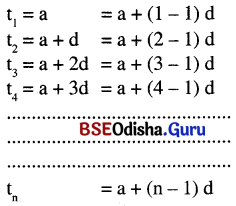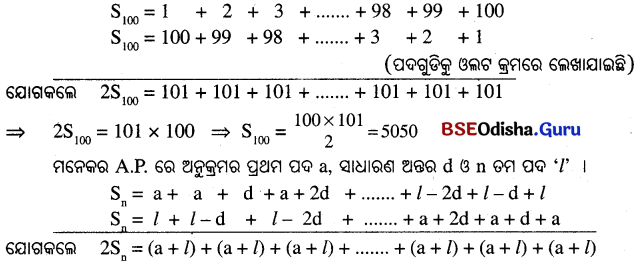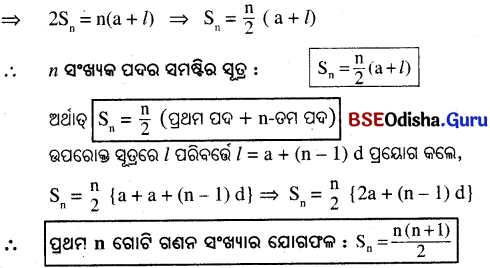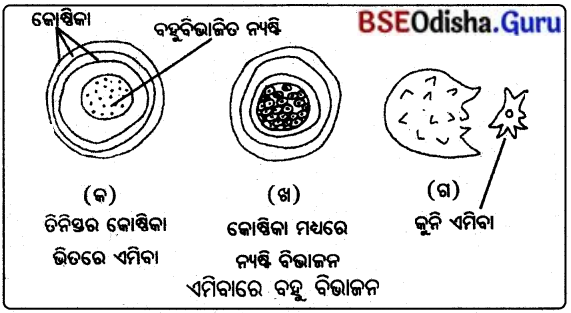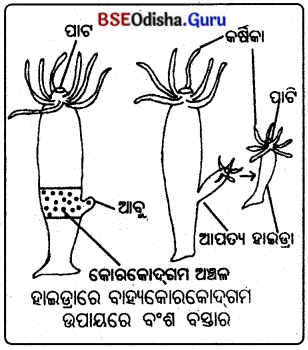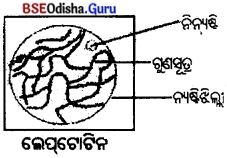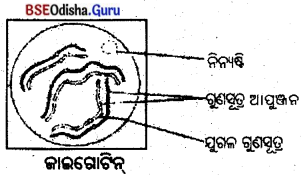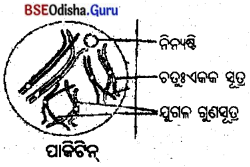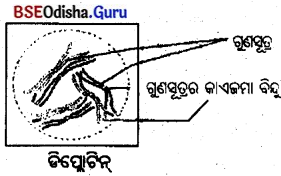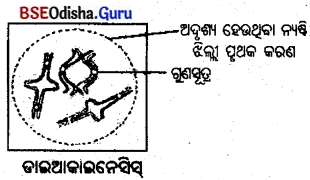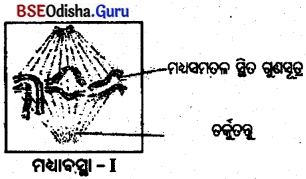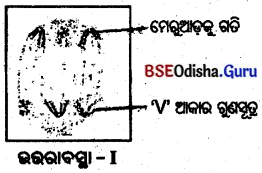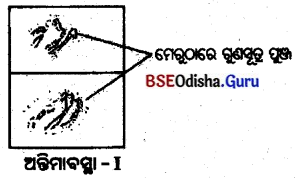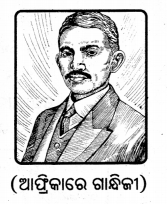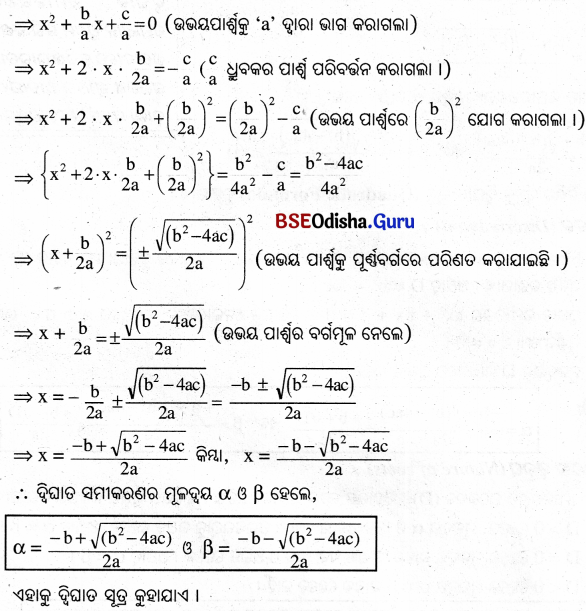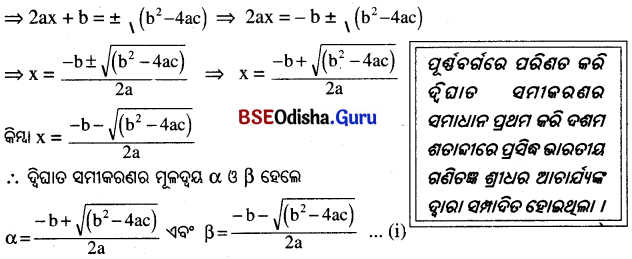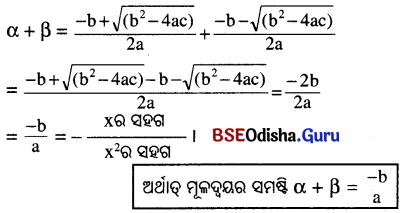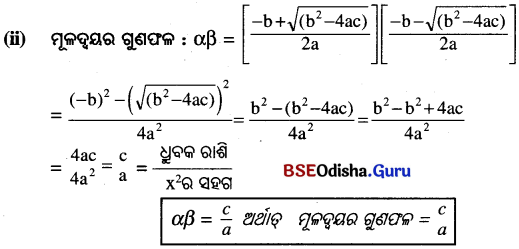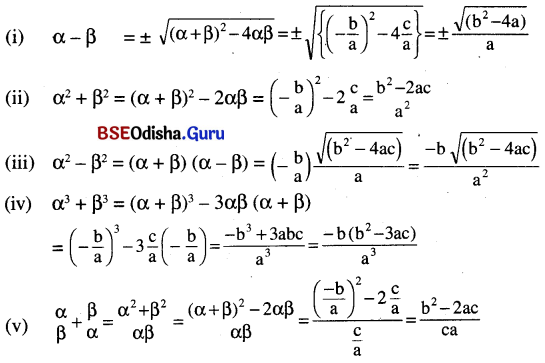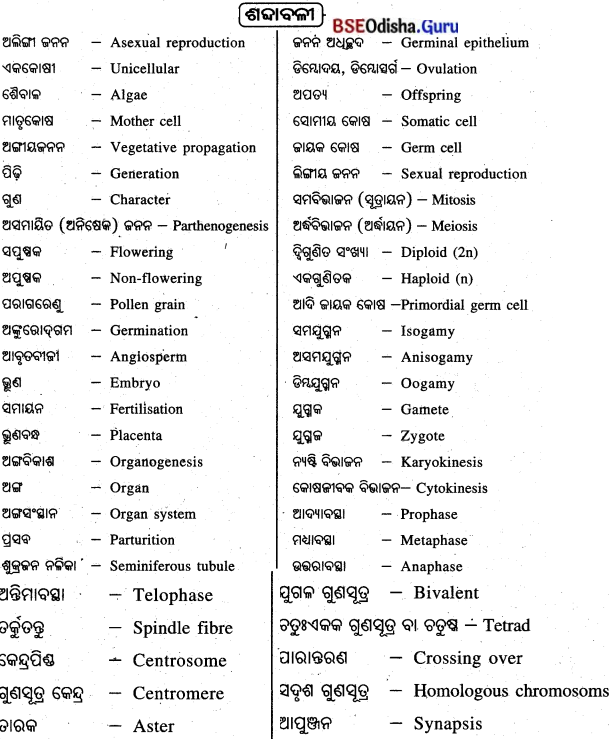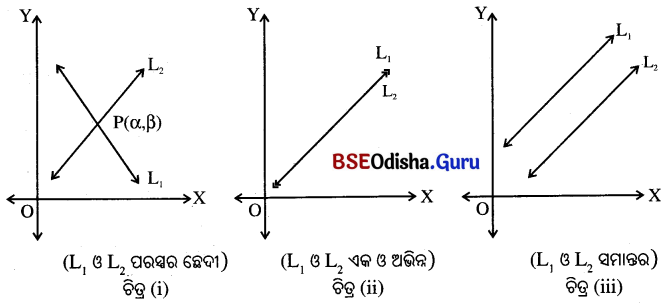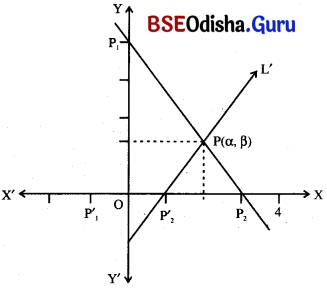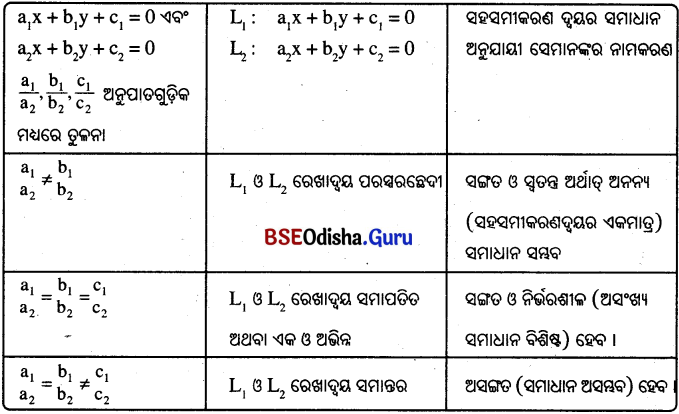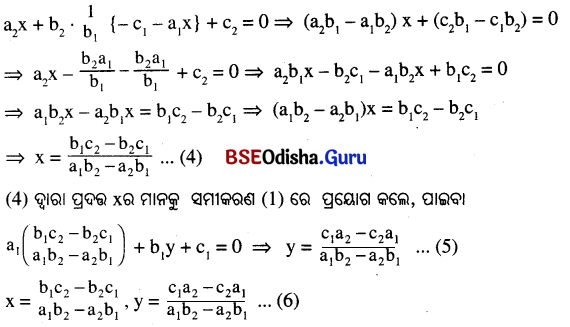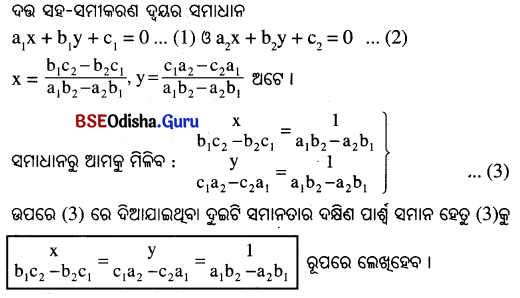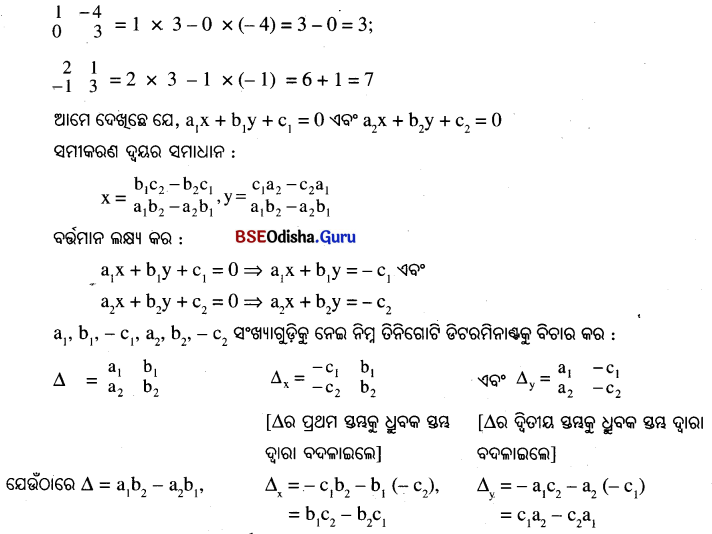Odisha State Board BSE Odisha 10th Class Physical Science Important Questions Chapter 6 ଆଲୋକ- ପ୍ରତିଫଳନ ଓ ପ୍ରତିସରଣ Important Questions and Answers.
BSE Odisha 10th Class Physical Science Important Questions Chapter 6 ଆଲୋକ- ପ୍ରତିଫଳନ ଓ ପ୍ରତିସରଣ
Objective Type Questions with Answers
A ଗୋଟିଏ ବାକ୍ୟରେ ଉତ୍ତର ଦିଅ ।
1. ଆପତିତ ରଶ୍ମି ଓ ପ୍ରତିଫଳିତ ରଶ୍ମି ମଧ୍ଯରେ 80° କୋଣ ସୃଷ୍ଟି ହେଲେ ଆପତନ କୋଣର ପରିମାଣ କେତେ ଡିଗ୍ରୀ ?
ଉ –
0°
2. ବର୍ତ୍ତୁଳାକାର ଦର୍ପଣର ପ୍ରମୁଖ ଅକ୍ଷ ପୋଲ୍ ଉପରେ ଦର୍ପଣର ପୃଷ୍ଠପ୍ରତି କ’ଣ ହେବ ?
ଉ –
ଅଭିଲମ୍ବ
3. ପୋଲ୍ ଓ ବକ୍ରତା କେନ୍ଦ୍ର ମଧ୍ୟରେ ଥିବା ଦୂରତାକୁ କ’ଣ କହନ୍ତି ?
ଉ
ବକ୍ରତା ବ୍ୟାସାର୍ଦ୍ଧ
4. ଦନ୍ତ ଚିକିତ୍ସକମାନେ କେଉଁ ଦର୍ପଣ ବ୍ୟବହାର କରନ୍ତି ?
ଉ
ଅବତଳ
5. ସାଧାରଣତଃ ଗାଡି ଚାଳକ ପଛପାଖ ଦେଖୁବାପାଇଁ ଗାଡ଼ିରେ କେଉଁ ଦର୍ପଣ ବ୍ୟବହାର କରାଯାଇଥାଏ ?
ଉ
ଉତ୍ତଳ
6. ପ୍ରତିସରଣରେ ଆପତନ କୋଣ ଶୂନହେଲେ ପ୍ରତିସରଣ କୋଣ କେତେ ଡିଗ୍ରୀ ହେବ ?
ଉ
45°
7. ବସ୍ତୁ ଅବତଳ ଦର୍ପଣର କେଉଁଠାରେ ରହିଲେ ବସ୍ତୁର ପ୍ରତିବିମ୍ବ ବାସ୍ତବ, ଓଲଟା ଓ ସମାନ ଆକାରର ପ୍ରତିବିମ୍ବ ଗଠିତ. ହୁଏ ?
ଉ
ବକ୍ରତା କେନ୍ଦ୍ର
8. ସୋଲାର କୁକର୍ରେ କେଉଁ ଦର୍ପଣ ବ୍ୟବହାର କରାଯାଏ ?
ଉ
ଅବତଳ ଦର୍ପଣ
9. ଅବତଳ ଦର୍ପଣରେ ବସ୍ତୁର କେଉଁ ଅବସ୍ଥାନ ପାଇଁ ପ୍ରତିବିମ୍ବ ପରିବର୍ଦ୍ଧିତ ଆଭାସୀ ଓ ସଳଖ ହେବ ?
ଉ
P ଓ F ମଧ୍ୟରେ
10. ଅବତଳ ଦର୍ପଣରେ ଫୋକସ୍ ଦୂରତା 10 cm ଓ ବସ୍ତୁଟି 20 cm ଦୂରରେ ଅଛି । ପ୍ରତିବିମ୍ବର ପ୍ରକୃତି କ’ଣ ହେବ ?
ଉ
ବାସ୍ତବ ଓ ସମାନ
11. ପୋଠାରୁ ବସ୍ତୁର ଦୂରତାକୁ କେଉଁ ସଙ୍କେତଦ୍ୱାରା ଲେଖାଯାଏ ?
ଉ
u
12. ଗୋଟିଏ ଅବତଳ ଦର୍ପଣରେ ସୃଷ୍ଟ ପ୍ରତିବିମ୍ବ ଆଭାସୀ, ସଳଖ ଓ ବସ୍ତୁଠାରୁ ଆକାରରେ ବଡ଼ । ତାହାହେଲେ ବସ୍ତୁ କେଉଁଠି ଅବସ୍ଥିତ ?
ଉ
ଦର୍ପଣର ପୋଲ୍ ଓ ପ୍ରମୁଖ ଫୋକସ୍ ମଧ୍ୟରେ

13. ବର୍ତ୍ତୁଳ ଦର୍ପଣରେ ତୀର୍ଯ୍ୟକ୍ ଭାବରେ ଆଲୋକ ରଶ୍ମି ପୋଲ୍ ବିନ୍ଦୁଠାରେ ଆପତିତ ହେଲେ ତାହା କିପରି ଭାବରେ ପ୍ରତିଫଳିତ ହୁଏ ?
ଉ
ତୀର୍ଯ୍ୟକ୍ ଭାବରେ
14. ଅବତଳ ଦର୍ପଣ ନିକଟରେ 30 ସେ.ମି. ଦୂରରେ ଥିବା ବସ୍ତୁର ପ୍ରତିବିମ୍ବ 20 ସେ.ମି. ଦୂରରେ ଉତ୍ପନ୍ନ ହେଲା । ଲେନସ୍ର ଫୋକସ୍ ଦୂରତା କେତେ ?
ଉ
60 ସେ.ମି.
15. ବାସ୍ତବ ପ୍ରତିବିମ୍ବର ଉଚ୍ଚତାକୁ କେଉଁ ଚିହ୍ନ ରୂପେ ନିଆଯାଏ ?
ଉ
ବିଯୁକ୍ତାତ୍ମକ
16. ଏକ ଦର୍ପଣ ସମ୍ମୁଖରେ 6 m ଦୂରରେ ଗୋଟିଏ ବସ୍ତୁ ଏକ-ଚତୁର୍ଥାଂଶ ପରିବର୍ତ୍ତନ ସୃଷ୍ଟି କଲେ ଦର୍ପଣଟି କ’ଣ ହେବ ?
ଉ
ଉତ୍ତଳ
17. ପ୍ରମୁଖ ଅକ୍ଷର ଉପର ଆଡ଼କୁ +Y ଅକ୍ଷ ଦିଗରେ ଉଚ୍ଚତାର ଚିହ୍ନ କ’ଣ ?
ଉ
ଯୁକ୍ତାତ୍ମକ
18. u, v, f, R ସାଂଖିକ ମାନ ସ୍ଥାପନ କଲାବେଳେ ନୂତନ କେଉଁ ସଙ୍କେତ ପଥ ଅନୁସରଣ କରାଯାଏ ?
ଉ
କାର୍ଟେସିଆନ୍
19. ପରିବର୍ଦ୍ଧନ (m) ର ମୂଲ୍ୟ 1 ଠାରୁ କମ୍ ହେଲେ ପ୍ରତିବିମ୍ବର ଆକୃତିଟି କ’ଣ ହେବ ?
ଉ
ବସ୍ତୁର ଉଚ୍ଚତା ତୁଳନାରେ କ୍ଷୁଦ୍ର
20. ଆପତିତ ରଶ୍ମି ଓ ନିର୍ଗତ ରଶ୍ମି ମଧ୍ୟରେ ଥିବା ବ୍ୟବଧାନ ଦୂରତାକୁ କ’ଣ କହନ୍ତି ?
ଉ
ପାର୍ଶ୍ବବିସ୍ଥାପନ
21. ପରମ ପ୍ରତିସରଣାଙ୍କକୁ କେଉଁ ସଙ୍କେତ ମାଧ୍ୟମରେ ପ୍ରକାଶ କରାଯାଏ ?
ଉ
n20
22. ଆଲୋକ 1.50 ପ୍ରତିସରଣାଙ୍କ ବିଶିଷ୍ଟ କାଚ ମଧ୍ୟକୁ ପ୍ରବେଶ କଲେ କାଚ ଭିତରେ ଆଲୋକର ବେଗ କେତେ ?
ଉ
2 × 108 m/s
23. ଆଲୋକର ବାୟୁରେ ବେଗ ଓ ଅନ୍ୟ ମାଧ୍ୟମରେ ବେଗର ଅନୁପାତକୁ କ’ଣ କୁହାଯାଏ ?
ଉ
ପରମ ପ୍ରତିସରଣାଙ୍କ
24. ପ୍ରତିସରଣାଙ୍କର ଏକକ କ’ଣ ଅଟେ ?
ଉ
ଏକକ ବିହୀନ
25. ବାୟୁ ତୁଳନାରେ ଜଳର ପ୍ରତିସରଣାଙ୍କ ମୁଁ \(\frac { 4 }{ 3 }\)। ଜଳ ତୁଳନାରେ ବାୟୁର ପ୍ରତିସରଣାଙ୍କ କେତେ ?
ଉ
0.75
26. କେଉଁ ମାଧ୍ୟମରେ ପ୍ରତିସରଣାଙ୍କ ସର୍ବନିମ୍ନ ?
ଉ
ଶୂନ୍ୟରେ
27. ଦର୍ପଣରେ ବକ୍ରତା କେନ୍ଦ୍ର ଦେଇ ଅତିକ୍ରମ କରୁଥିବା ଆଲୋକ ରଶ୍ମିର ଆପତନ କୋଣ କେତେ ?
ଉ
0°
28. ବାୟୁରେ ଆଲୋକର ବେଗ 3 x 108 m/s ଓ ମାଧ୍ୟମରେ 1.25 x 108 m/s ହେଲେ ମାଧ୍ୟମର ପ୍ରତିସରଣାଙ୍କ କେତେ ?
ଉ
2.4
29. ଆୟତଘନାକାର କାଚ ସ୍ଲାବ୍ରେ କେତେ ଥର ପ୍ରତିସରଣ ହୁଏ ?
ଉ
ଦୁଇଥର

30. A, B, C ଓ Dର ପ୍ରତିସରଣାଙ୍କ ଯଥାକ୍ରମେ 1.5, 1.7, 1.3 ଓ 1.4 ହେଲେ କେଉଁଥିରେ ଆଲୋକର ବେଗ ସର୍ବାଧିକ ?
ଉ
C
31. ଏକ ସମତଳ ଦର୍ପଣରେ ଆପତନ କୋଣ 30° ହେଲେ ପ୍ରତିଫଳନ କୋଣଟି କେତେ ?
ଉ
30°
32. ଉତ୍ତଳ ଲେନ୍ସରେ କାହା ମଧ୍ୟଦେଇ ଗତି କରି ପ୍ରତିସୃତ ରଶ୍ମି ପ୍ରମୁଖ ଅକ୍ଷସହ ସମାନ୍ତର ଭାବେ ଗତିକରେ ?
ଉ
ଫୋକସ୍
33. ଲେନ୍ସର ସମସ୍ତ ଦୂରତା କେଉଁଠାରୁ ମପାଯାଏ ?
ଉ
ଆଲୋକ କେନ୍ଦ୍ର
34. ବସ୍ତୁର କେଉଁଠାରେ ଅବସ୍ଥାନ ପାଇଁ ଉଭଳ ଲେନ୍ସରେ ପ୍ରତିବିମ୍ବ ଅତ୍ୟନ୍ତ ବର୍ଣ୍ଣିତ ହୋଇଥାଏ ?
ଉ
F1 ଠାରେ
35. ଏକ ଉତ୍ତଳ ଲେନ୍ସରେ ଆଭାସୀ ପ୍ରତିବିମ୍ବ ପାଇଁ ବସ୍ତୁକୁ କେଉଁଠାରେ ରଖୁବା ଆବଶ୍ୟକ ?
ଉ
F1 ଓ O ମଧ୍ୟରେ
36. 10 ସେ.ମି. ଉଚ୍ଚତାର ଏକ ବସ୍ତୁ ଉତ୍ତଳ ଲେନ୍ସ ଆଗରେ ରଖିଲେ ତା’ର ପ୍ରତିବିମ୍ବ ଲେନ୍ସର ପଛପଟେ 10 ସେ.ମି. ଦୂରରେ ଗଠିତ ହେଲା । ତେବେ ବସ୍ତୁଟି ଲେନ୍ସର କେଉଁଠାରେ ଥିଲା ।
ଉ
2F1 ଠାରେ
37. ଏକ ଉତ୍ତଳ ଲେନ୍ସର-ଫୋକସ୍ ଦୂରତା 10 ସେ.ମି. ବସ୍ତୁକୁ କେଉଁଠାରେ ରଖୁଲେ ବସ୍ତୁଟି ଓଲଟା ଓ ବସ୍ତୁର ଆକାର ସହ ସମାନ ଆକାରର ପ୍ରତିବିମ୍ବ ଗଠିତ ହେବ ?
ଉ
20 ସେ.ମି ଦୁରରେ
38. ଉତ୍ତଳ ଲେନ୍ସ ଆଡ଼କୁ ବସ୍ତୁଟି ଗତିକଲେ ପ୍ରତିବିମ୍ବର ଆକାରରେ କ’ଣ ପରିବର୍ତ୍ତନ ହୁଏ ?
ଉ
ସମାନ ରହେ
39. ଅବତଳ ଲେନସ୍ରେ ପରିବର୍ତନ ସର୍ବଦା କେତେ ?
ଉ
1 ଠାରୁ ସାନ

40, ଗୋଟିଏ ଉତ୍ତଳ ଲେନସ୍ର ସମ୍ମୁଖରେ ବସ୍ତୁ କେଉଁଠି ରହିଲେ ସମାନ ଆକାରର ବାସ୍ତବ ପ୍ରତିବିମ୍ବ ମିଳିପାରିବ ?
ଉ
ଫୋକସ୍ ଦୂରତାର 2 ଗୁଣ ଦୂରତାରେ
41. ଉତ୍ତର ଲେନ୍ସର ପରିବର୍ଜନ – 1 ହେଲେ ବସ୍ତୁଟି ଲେନ୍ସର କେଉଁଠାରେ ରହିବ ?
ଉ
2F1 ଠାରେ
42. ଉତ୍ତଳ ଲେନ୍ସରେ 4 ଗୁଣ ପରିବର୍ତ୍ତନ ହୋଇ ବାସ୍ତବ ପ୍ରତିବିମ୍ବ ଲେନ୍ସଠାରୁ 60 ସେ.ମି. ଦୂରରେ ଗଠିତ ହେଲେ ଉତ୍ତଳ ଲେନ୍ସର ଫୋକସ୍ ଦୂରତା କେତେ ?
ଉ
12 ସେ.ମି.
43. ଉତ୍ତଳ ଲେନସ୍ର ପରିବର୍ଦ୍ଧନ +6 ହେଲେ ବସ୍ତୁଟି କେଉଁଠି ରହିବ ?
ଉ
f ଓ O ମଧ୍ୟରେ
44. କାର୍ଟେସିଆନ୍ ପ୍ରଥା ଅନୁଯାୟୀ ଲେନ୍ସର ଫୋକସ୍ ଦୂରତାର ସୂତ୍ର କ’ଣ ?
ଉ
f = \(\frac { uv }{ u-v }\)
45. ଉତ୍ତଳ ଲେନ୍ସରେ 0.09 m ଦୂରରେ ଅବସ୍ଥିତ ବସ୍ତୁର ପ୍ରତିବିମ୍ବ 36 cm ଠାରେ ଗଠିତ ହେଲେ ପରିବର୍ତ୍ତନ କେତେ ?
ଉ
40
46. ଲେନ୍ସଗୁଡ଼ିକର ପାୱାର P1, P2, ଓ P3, ହେଲେ ସମୂହ ପାୱାର P = କେତେ ?
ଉ
P1 + P2 + P3
47. 25 cm ଫୋକସ୍ ଦୂରତା ବିଶିଷ୍ଟ ଏକ ଅବତଳ ଲେନ୍ସର ପାୱାର କେତେ ?
ଉ
– 4D
48. ପାୱାର 4D ବିଶିଷ୍ଟ ଉତ୍ତଳ ଲେନ୍ସ କାନ୍ଥଠାରୁ 50 ସେ.ମି. ଦୂରରେ ଅଛି । ଗୋଟିଏ ବସ୍ତୁକୁ କେତେ ଦୂରତାରେ ରଖିଲେ ଏହାର ବାସ୍ତବ ପ୍ରତିବିମ୍ବ କାନ୍ଥରେ ପଡ଼ିବ ?
ଉ
50 ସେ.ମି.
49. A ଓ B ଉଁଭଳ ଲେନ୍ସଦ୍ବୟର ଫୋକସ୍ ଦୂରତା ଯଥାକ୍ରମେ 5 ସେ.ମି. ଓ 50 ସେ.ମି. । ଉକ୍ତ ଲେନ୍ସଦ୍ଵୟ ମଧ୍ୟରୁ କାହାର ପାୱାର କେତେ ?
ଉ
20 D ଓ 2 D
50. ଆୟତଘନାକାର କାଚର ମୋଟେଇ କମିଲେ ପାର୍ଶ୍ଵବିସ୍ଥାପନର ପରିମାଣ କ’ଣ ହେବ ?
ଉ
ପ୍ରଥମେ କମେ ଓ ପରେ ବଢ଼େ,
51. ଲେନସ୍ର ଫୋକସ୍ ଦୂରତା 20 ସେ.ମି. ହେଲେ ତାହାର ପାୱାର କେତେ ?
ଉ
5D
52. ମାଧ୍ୟମର ପରମ ପ୍ରତିସରଣାଙ୍କ ସେହି ମାଧ୍ୟମରେ ଆଲୋକର ବେଗ ପରସ୍ପରସହ କ’ଣ ?
ଉ
ସମାନ
53. ଉପରୁ ଏକ ଜଳପୂର୍ଣ ଟ୍ୟାଙ୍କକୁ ଚାହିଁଲେ 3m ଗଭୀର ଜଣାପଡ଼େ । ଜଳର ପ୍ରତିସରଣାଙ୍କ 4/3 ହେଲେ ଟାଙ୍କିର ପ୍ରକୃତ ଗଭୀରତା
ଉ
4m
54. ଏକ ଅବତଳ ଦର୍ପଣର ଫୋକସ୍ ଦୂରତା 10cm | ଦନ୍ତର ବର୍ଦ୍ଧିତ ପ୍ରତିବିମ୍ବ ଦେଖୁବାପାଇଁ ଜଣେ ଦାନ୍ତ ଓ ଦର୍ପଣକୁ କେତେ ଦୂରରେ ରଖୁବ ?
ଉ
8cm
55. ପତନ ରଶ୍ମି ଓ ଦର୍ପଣ ମଧ୍ୟରେ କୋଣର ପରିମାଣ 60° ହେଲେ ଆପତିତରଶ୍ମି ଓ ପ୍ରତିଫଳିତ ରଶ୍ମି ମଧ୍ୟରେ କୋଣର
ଉ
1200
56. ସିଧାସଳଖ ଲେନସ୍ ପାୱାର ମାପିବାପାଇଁ ବ୍ୟବହୃତ ଯନ୍ତ୍ରଟିର ନାମ କ’ଣ ?
ଉ
ଜେନିଭାଲେନ୍ସ ମାପକ

B ଶୂନ୍ୟସ୍ଥାନ ପୂରଣ କର ।
1. ବିକୀର୍ଶନ ପରିଘଟଣାକୁ ବୁଝାଇବା ପାଇଁ ଆଲୋକକୁ ଏକ ………………. କହନ୍ତି ।
2. ବକ୍ରପୃଷ୍ଠଥବା ଦର୍ପଣକୁ ……………….. କହନ୍ତି ।
3. ଅବତଳ ଦର୍ପଣର ବକ୍ର ପ୍ରତିଫଳନ ପୃଷ୍ଠ ଗୋଲକର ………………….. ଆଡ଼କୁ ରହିଥାଏ ।
4. ଉତ୍ତଳ ଦର୍ପଣର ବଜ୍ର ପ୍ରତିଫଳନ ପୃଷ୍ଠ ଗୋଲକର ………………….. ର ବିପରୀତ ଦିଗରେ ଥାଏ ।
5. ବର୍ତ୍ତୁଳାକାର ଦର୍ପଣର ମଧ୍ୟବିନ୍ଦୁକୁ ………………… କହନ୍ତି ।
6. ପୋଲ୍ P ଓ ବକ୍ରତାକେନ୍ଦ୍ର C ମଧ୍ୟରେ ଥିବା ଦୂରତା PC କୁ ……………….. କହନ୍ତି ।
7. ବର୍ତ୍ତୁଳାକାର ଦର୍ପଣର ପୋଲ୍ ଓ ଫୋକସ୍ ମଧ୍ୟରେ ଥିବା ଦୂରତାକୁ ……………… କହନ୍ତି ।
8. ବକ୍ରତା ବ୍ୟାସାର୍ଦ୍ଧ ଦ୍ଵାରକଠାରୁ ………………….. |
9. ……………. ଦର୍ପଣରେ ବସ୍ତୁର ସଳଖ ଓ ପରିବର୍ଦ୍ଧିତ ପ୍ରତିବିମ୍ବ ଦେଖହୁଏ ।
10. ଦର୍ପଣର ସୂତ୍ରଟି …………………. |
11. ଅବତଳ ଦର୍ପଣର ‘C’ ଠାରେ ବସ୍ତୁର ଅବସ୍ଥିତି ହେଲେ ପ୍ରତିବିମ୍ବର ଅବସ୍ଥିତି ………………….. ଠାରେ ହୋଇଥାଏ ।
12. ଅବତଳ ଦର୍ପଣର F ଠାରେ ବସ୍ତୁର ସ୍ଥିତି ପାଇଁ ପ୍ରତିବିମ୍ବର ସ୍ଥିତି ……………….. ଠାରେ ହୋଇଥାଏ ।
13. ………………… ଦର୍ପଣରେ ସର୍ବଦା ଆଭାସୀ ପ୍ରତିବିମ୍ବ ଗଠିତ ହୁଏ ।
14. ମୁଖ୍ୟ ଅକ୍ଷ ପ୍ରତି ସମାନ୍ତର ରଶ୍ମିଗୁଚ୍ଛ ପ୍ରତିଫଳନ ପରେ ଅବତଳ ଦର୍ପଣରେ ………………. ମଧ୍ୟରେଇ ଯାଏ |
15. ଗୋଟିଏ ଅବତଳ ଦର୍ପଣ ସମ୍ମୁଖରେ X ସେ.ମି. ଦୂରତାରେ ଅବସ୍ଥିତ ଏକ ବସ୍ତୁର ପ୍ରତିବିମ୍ବ ସେହି ସ୍ଥାନରେ ସୃଷ୍ଟି ହେଲେ ଦର୍ପଣର ଫୋକସ୍ ଦୂରତା ……………………….. ସେ.ମି. ହେବ ।
16. ………………… ପ୍ରତିଫଳନ ପୃଷ୍ଠର ବିସ୍ତୃତି ସୂଚାଏ ।
17. ଦର୍ପଣ ଉପରେ …………………. ଦିଗରୁ ଆଲୋକ ରଶ୍ମି ଆପତିତ ହୁଏ ।
18. …………….. ଦର୍ପଣର ଫୋକସ୍ ଦୂରତା ଯୁକ୍ତାତ୍ମକ ।
19. ଶୂନ୍ୟରେ ଆଲୋକର ବେଗ ……………….. ମି. /ସେ. |
20. କ୍ରାଉନ୍ କାଚର ପ୍ରତିସରଣାଙ୍କ …………………. |
21. ………………….. ର ପ୍ରତିସରଣାଙ୍କ ସର୍ବାଧିକ ।
22. ଲେନସ୍ର ……………………… ବିନ୍ଦୁଦେଇ ଯାଇଥିବା ରଶ୍ମି ବିପଥନ ହୁଏ ନାହିଁ ।
23. ……………… ଲେନ୍ସକୁ ଅଭିସାରୀ ଲେନ୍ସ କହନ୍ତି ।
24. ଲେନ୍ସର ପାୱାରକୁ ………………………. ଏକକରେ ମପାଯାଏ ।
25. ଲେନ୍ସର ମଧ୍ୟବିନ୍ଦୁକୁ ………………… କହନ୍ତି ।
26. ସମତଳ ଦର୍ପଣର ପରିବର୍ଦ୍ଧନ …………………….. |
27. ଲେନ୍ସର ସମସ୍ତ ଦୂରତା ଲେନ୍ସର …………….. ଠାରୁ ମପାଯାଏ ।
28. …………………….. ଦର୍ପଣରେ ବାସ୍ତବ ପ୍ରତିବିମ୍ବ ଗଠିତ ହୁଏ ।
29. 4 ମିଟର ଫୋକସ୍ ଦୂରତା ବିଶିଷ୍ଟ ଅବତଳ ଲେନ୍ସର ପାୱାର ……………….. ଡାୟପଟର୍ ।
30. ଆଲୋକ ପ୍ରତିସରଣ ନିୟମର ଆବିଷ୍କାରକ ………………………. |
31. ଦର୍ପଣର ଫୋକସ୍ ଦୂରତା ଓ ବକ୍ରତା ବ୍ୟାସାର୍ଷର ଅନୁପାତ …………………….. |
32. ଅବତଳ ଦର୍ପଣରେ ଫୋକସ୍ ଦୂରତା 10 cm ଓ ବସ୍ତୁଟି 20 cm ଦୂରରେ ଅଛି । ତେବେ ପ୍ରତିବିମ୍ବଟି ……………………. ହେବ ।
33. …………………… ଲେନ୍ସରେ ସର୍ବଦା ଆଭାସୀ ପ୍ରତିବିମ୍ବ ଗଠିତ ହୁଏ ।
34. ବସ୍ତୁର ଅବସ୍ଥିତି 2F1 ଠାରେ ଥିଲେ ଉତ୍ତଳ ଲେନ୍ସର ପ୍ରତିବିମ୍ବ ଠାରେ ………………………. ଗଠିତ ହେବ ।
35. ଲେନସ୍ ଗୁଡ଼ିକର ପାୱାର P1, P2, P3, ହେଲେ ସମୂହ ମୋଟ ପାୱାର P = …………… ହେବ ।
36. +2.0 D ଓ +0.25 D ପାୱାର ବିଶିଷ୍ଟ ଲେନ୍ସ ମିଶିଲେ ତାହା ଗୋଟିଏ …………………. D ପାୱାର ବିଶିଷ୍ଟ ଲେନ୍ସସର ସମତୁଲ୍ୟ ହୁଏ ।
37. ଲେନ୍ସ ଅଣୁବୀକ୍ଷଣରେ …………………. ଭାବେ ବ୍ୟବହୃତ ହୁଏ ।
38. ଗୋଟିଏ ଚାମଚର ଭିତର ପାଖ …………………….. ଦର୍ପଣ ଆକାରର ।
39. ସମତଳ ଦର୍ପଣରେ ଦର୍ପଣଠାରୁ ବସ୍ତୁର ଦୂରତା ଓ ପ୍ରତିବିମ୍ବର ଦୂରତା ………………….. |
40. ଦର୍ପଣର ଫୋକସ୍ ଦୂରତା ଓ ବକ୍ରତା ବ୍ୟାସାର୍ଦ୍ଧର ଅନୁପାତ ……………………… |
Answer:
1. ତରଙ୍ଗ
2. ବର୍ତ୍ତୁଳାକାର ଦର୍ପଣ
3. କେନ୍ଦ୍ର
4. କେନ୍ଦ୍ର
5. ପୋଲ୍
6. ବକ୍ରତା ବ୍ୟାସାର୍ଦ୍ଧ
7. ଫୋକସ୍ ଦୂରତା
8. ବହୁତ ବେଶୀ
9. ଅବତଳ ଦର୍ପଣ
10. \(\frac { 1 }{ u }\) + \(\frac { 1 }{ v }\) = \(\frac { 1 }{ f }\)
11. C
12. ଅନନ୍ତ ଦୂରତା
13. ଉତ୍ତଳ ଦର୍ପଣ
14. ଫୋକସ୍
15. \(\frac { X }{ 2 }\)
16. ଦ୍ବାରକ
17. ବାମ
18. ଉତ୍ତଳ
19. 3 × 108 ମି. / ସେ.
20. 1.52
21. ହୀରା
22. ଆଲୋକ କେନ୍ଦ୍ର
23. ଉତ୍ତଳ
24. ଡାୟପ୍ର
25. ଆଲୋକ କେନ୍ଦ୍ର
26. (+1)
27. ଆଲୋକ କେନ୍ଦ୍ର
28. ଅବତଳ
29. (-0.25)
30. ସ୍ଲେଲ୍
31. (1:2)
32. ବାସ୍ତବ ଓ ସମାନ
33. ଅବତଳ
34. 2F2
35. P = P1 + P2 + P3
36. +2.25 D
37. ଅଭିଦୃଶ୍ୟକ
38. ଅବତଳ
39. ସମାନ
40. 1 : 2 କିମ୍ବା 0.5

C ଠିକ୍ ଉକ୍ତି ପାଇଁ (✓) ବା ଭୁଲ ଉକ୍ତି ପାଇଁ (x) ଲେଖ ।
1. ଅନେକ ଆଲୋକୀୟ ଯନ୍ତ୍ରରେ ଏକାଧିକ ଲେନ୍ସ ବ୍ୟବହାର କରାଯାଇଥାଏ ।
2. ଉତ୍ତଳ ଲେନ୍ସର ପାୱାର୍ ବିଯୁକ୍ତାତ୍ମକ ।
3. ଲଘୁ ମାଧ୍ୟମରୁ ଘନ ମାଧ୍ୟମକୁ ଆଲୋକ ଗତି କଲେ ତାହାର ବେଗ ବଢ଼ିଯାଏ ।
4. ବର୍ତ୍ତୁଳାକାର ଲେନ୍ସ ମଝିରେ ଯେଉଁ କ୍ଷୁଦ୍ର ବୃତ୍ତାକାର ପରିସୀମା ଭିତରେ ଲେନ୍ସ ପ୍ରତିସରଣ କରେ ତାହାର ବ୍ୟାସକୁ ଲେନ୍ସର ଦ୍ଵାରକ କୁହାଯାଏ ।
5. ଅବତଳ ଲେନ୍ସରେ ସର୍ବଦା କ୍ଷୁଦ୍ର, ସଳଖ ଓ ଆଭାସୀ ପ୍ରତିବିମ୍ବ ସୃଷ୍ଟି ହୁଏ ।
6. ଅବତଳ ଦର୍ପଣର x cm ଦୂରରେ ଅବସ୍ଥିତ ବସ୍ତୁର ପ୍ରତିବିମ୍ବ ସେହିଠାରେ ସୃଷ୍ଟି ହେଲେ ଦର୍ପଣର ଫୋକସ୍ ଦୂରତା 2x ସେ. ମି. |
7. ଗୋଟିଏ ଅବତଳ ଦର୍ପଣରେ ବସ୍ତୁର ଦୂରତା – 10 cm ଓ ଫୋକସ୍ ଦୂରତା + 15 cm ହେଲେ ପ୍ରତିବିମ୍ବର ଦୂରତା + 6 |
8. ଅବତଳ ଦର୍ପଣ କ୍ଷେତ୍ରରେ ବସ୍ତୁର ଅବସ୍ଥାନ ଓ ପ୍ରତିବିମ୍ବ ମଧ୍ଯରେ ସର୍ବନିମ୍ନ ଦୂରତା 0 |
9. ବସ୍ତୁର ଏକ-ପଞ୍ଚମାଂଶ ଆକାରର ପ୍ରତିବିମ୍ବ ଦର୍ପଣଠାରୁ 18 ସେ.ମି. ଦୂରତାରେ ଗଠିତ ହେଲା । ଦର୍ପଣର ଫୋକସ୍ ଦୂରତା 18 ସେ.ମି. ।
10. ଦୁଇଟି ପ୍ରତିଫଳିତ ରଶ୍ମିର ପ୍ରତିଚ୍ଛେଦ ବିନ୍ଦୁରେ ସଳଖ ଆକାରର ପ୍ରତିବିମ୍ବ ସୃଷ୍ଟି ହୁଏ ।
11. ବର୍ତ୍ତୁଳ ଦର୍ପଣରେ ତୀର୍ଯ୍ୟକ୍ ଭାବରେ ଆଲୋକ ରଶ୍ମି ପୋଲ୍ ବିନ୍ଦୁଠାରେ ଆପତିତ ହେଲେ ତାହା ତୀର୍ଯ୍ୟକ୍ ଭାବେ ପ୍ରତିଫଳିତ ହୁଏ ।
12. ଅବତଳ ଦର୍ପଣ ନିକଟରେ 30 ସେ.ମି. ଦୂରରେ ଥିବା ବସ୍ତୁର ପ୍ରତିବିମ୍ବ 20 ସେ.ମି. ଦୂରରେ ଉତ୍ପନ୍ନ ହେଲା । ଲେନ୍ସର ଫୋକସ୍ ଦୂରତା 60 ସେ.ମି. ।
13. ଏକ ବର୍ତ୍ତୁଳ ଦର୍ପଣର ବକ୍ରତା ବ୍ୟାସାର୍ଦ୍ଧ ଓ ଫୋକସ୍ ଦୂରତା ଯଥାକ୍ରମେ R ଓ f ହେଲେ, R = 2f ।
14. ଗୋଟିଏ ଅବତଳ ଦର୍ପଣ ଆଗରେ 10 cm ଦୂରରେ ବସ୍ତୁଟି ରଖିଲେ 3 ଗୁଣ ପରିବର୍ଦ୍ଧିତ ବାସ୍ତବ ପ୍ରତିବିମ୍ବ ପାଇଁ ବସ୍ତୁର ପ୍ରତିବିମ୍ବ 20 cm ଦୂରରେ ଗଠିତ ହେବ ।
15. ପରିବର୍ଦ୍ଧନ m = + 0.6 ଓ ବସ୍ତୁର ଉଚ୍ଚତା h1 = 5 cm ହେଲେ ପ୍ରତିବିମ୍ବର ଉଚ୍ଚତା 3 cm |
16. 20 cm ବକ୍ରତା ବ୍ୟାସାର୍ଦ୍ଧ ବିଶିଷ୍ଟ ଅଭିସାରୀ ଦର୍ପଣ ସମ୍ମୁଖରେ 15 cm ଦୂରରେ ବସ୍ତୁଟି ରହିଲେ ବସ୍ତୁର ପ୍ରତିବିମ୍ବର ଅବସ୍ଥାନ – 30 cm |
17. 2 cm ଉଚ୍ଚତା ବିଶିଷ୍ଟ ବସ୍ତୁର ଅବତଳ ଦର୍ପଣରେ ପରିବର୍ତ୍ତନ 20 cm ହେଲେ ପ୍ରତିବିମ୍ବର ଉଚ୍ଚତା 40 cm |
18. ପତିତ ରଶ୍ମି ଓ ନିର୍ଗତ ରଶ୍ମି ମଧ୍ୟରେ ଥିବା ବ୍ୟବଧାନ ଦୂରତାକୁ ପାର୍ଶ୍ଵ ବିସ୍ଥାପନ କହନ୍ତି ।
19. ପରମ ପ୍ରତିସରଣାଙ୍କକୁ n12 ସଙ୍କେତ ମାଧ୍ୟମରେ ପ୍ରକାଶ କରାଯାଏ ।
20. ଆଲୋକ 1.50 ପ୍ରତିସରଣାଙ୍କ ବିଶିଷ୍ଟ କାଚ ମଧ୍ୟକୁ ପ୍ରବେଶ କଲେ କାଚ ଭିତରେ ଆଲୋକର ବେଗ 2 x 108 m/s |
21. ଏକ ପ୍ରତିସରଣ ପୃଷ୍ଠରେ ଆପତନ କୋଣ 60° ଓ ପ୍ରତିସରଣ କୋଣ 30° ହେଲେ ପ୍ରତିସରଣାଙ୍କ 3 |
22. ସୋଲାର କୁକର୍ରେ ଉତ୍ତଳ ଦର୍ପଣ ବ୍ୟବହାର କରାଯାଏ ।
Answer:
1.✓
2. x
3. F
4. ✓
5. ✓
6. x
7. ✓
8. ✓
9. x
10. x
11.✔
12.✔
13.✔
14. x
15. ✔
16.✔
17.✔
18.✔
19. x
20. ✓
21. ✓
22. x
D ‘କ’ ସ୍ତମ୍ଭର ଶବ୍ଦକୁ ‘ଖ’ ସ୍ତମ୍ଭର ଶବ୍ଦ ସହ ମିଳନ କରି ଲେଖ ।
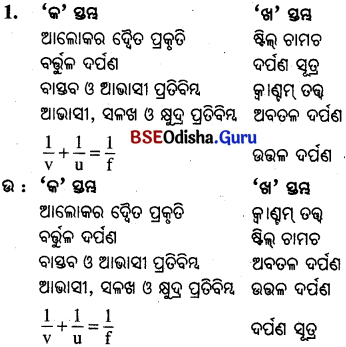
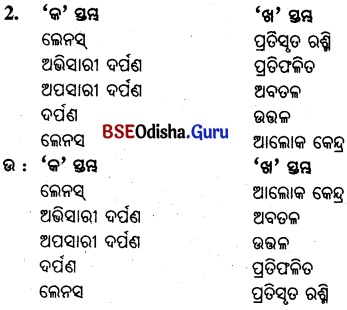
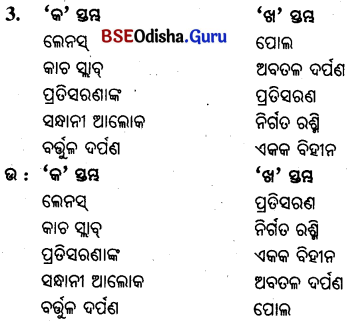
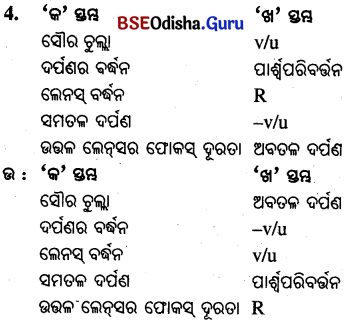
E ଗୋଟିଏ ବାକ୍ୟରେ ଉତ୍ତର ଦିଅ ।
1. ଆଲୋକର ବିକୀର୍ଶନ କାହାକୁ କହନ୍ତି ?
ଉ
ସରଳରେଖାରେ ଗତି କରୁଥିବା ଆଲୋକ ରଶ୍ମି ଗତିପଥରେ ଏକ କ୍ଷୁଦ୍ର ଅସ୍ଵଚ୍ଛ ବସ୍ତୁ ରଖିଲେ ଆଲୋକ ସେହି ଅତିକ୍ଷୁଦ୍ର ବସ୍ତୁ ପାଖରେ ବାଙ୍କିଯାଏ, ଏହାକୁ ଆଲୋକର ବିକୀର୍ଣ୍ଣନ କହନ୍ତି ।
2. ଧୁନିକ କ୍ୱାଣ୍ଟମ୍ ତତ୍ତ୍ବ କ’ଣ ?
ଉ –
ଆଲୋକ କେବଳ ତରଙ୍ଗ ନୁହେଁ କି କେବଳ କଣିକା ନୁହେଁ । ଆଲୋକ ତରଙ୍ଗ ଓ କଣିକା ଉଭୟର ଗୁଣ ପ୍ରଦର୍ଶନ କରେ । ଏହାକୁ ଆଲୋକର ଚୈତ ପ୍ରକୃତି କୁହାଯାଏ ।
3. ବର୍ତ୍ତୁଳାକାର ଦର୍ପଣ କାହାକୁ କହନ୍ତି ?
ଉ –
ବକ୍ରପୃଷ୍ଠ ବିଶିଷ୍ଟ ପ୍ରତିଫଳନକାରୀ ଦର୍ପଣକୁ ବର୍ତ୍ତୁଳାକାର ଦର୍ପଣ କହନ୍ତି ।
4. ଅବତଳ ଦର୍ପଣ କାହାକୁ କହନ୍ତି ?
ଭ –
ଯେଉଁ ବର୍ତ୍ତୁଳାକାର ଦର୍ପଣର ପ୍ରତିଫଳନ ପୃଷ୍ଠ ଭିତର ଆଡକୁ ବକ୍ର ହୋଇ ରହିଥାଏ ତାହାକୁ ଅବତଳ ଦର୍ପଣ କୁହାଯାଏ । ଉତ୍ତଳ ଦର୍ପଣ କାହାକୁ କହନ୍ତି ?
5. ଡତ୍ତଳ ଦର୍ପଣ କାହାକୁ କହନ୍ତି ?
ଉ –
ଯେଉଁ ବର୍ତ୍ତୁଳାକାର ଦର୍ପଣର ପ୍ରତିଫଳନ ପୃଷ୍ଠ ବାହାର ଆଡକୁ ବକ୍ର ହୋଇ ରହିଥାଏ ତାହାକୁ ଉତ୍ତଳ ଦର୍ପଣ କୁହାଯାଏ ।
6. ବର୍ତ୍ତୁଳାକାର ଦର୍ପଣର ପୋଲ୍ କାହାକୁ କହନ୍ତି ?
ଉ –
ବର୍ତ୍ତୁଳାକାର ଦର୍ପଣର ବକ୍ର ପ୍ରତିଫଳନ ପୃଷ୍ଠର ମଧ୍ୟବିନ୍ଦୁକୁ ପୋଲ୍ କହନ୍ତି । ଏହା ସାଧାରଣତଃ (P) ଅକ୍ଷର ଦ୍ଵାରା ଚିହ୍ନିତ କରାଯାଏ ।
7. ବର୍ତ୍ତୁଳାକାର ଦର୍ପଣର ବଜ୍ରତା କେନ୍ଦ୍ର କାହାକୁ କହନ୍ତି ?
ଉ –
ବର୍ତ୍ତୁଳାକାର ଦର୍ପଣ ଯେଉଁ ଗୋଲକର ଅଂଶ ହୋଇଥାଏ ସେହି ଗୋଲକର କେନ୍ଦ୍ରକୁ ବର୍ତ୍ତୁଳାକାର ଦର୍ପଣର ବକ୍ରତା କେନ୍ଦ୍ର କହନ୍ତି ।
8. ବର୍ତ୍ତୁଳାକାର ଦର୍ପଣର ବକ୍ରତା ବ୍ୟାସାର୍ଦ୍ଧ କାହାକୁ କହନ୍ତି ?
ଭ –
ବର୍ତ୍ତୁଳାକାର ଦର୍ପଣ ଯେଉଁ ଗୋଲକର ଅଂଶ ହୋଇଥାଏ, ସେହି ଗୋଲକର ବ୍ୟାସାର୍ଷକୁ ବର୍ତ୍ତୁଳାକାର ଦର୍ପଣର୍ ବଜ୍ରତା ବ୍ୟାସାର୍ଦ୍ଧ କହନ୍ତି ।
9. ବର୍ତ୍ତୁଳାକାର ଦର୍ପଣର ପ୍ରମୁଖ ଅକ୍ଷ କାହାକୁ କହନ୍ତି ?
ଉ –
ଯେଉଁ ସରଳରେଖା ବର୍ତ୍ତୁଳାକାର ଦର୍ପଣର ପୋଲ୍ ବକ୍ରତା କେନ୍ଦ୍ରକୁ ଯୋଗକରେ ତାହାକୁ ଦର୍ପଣର ପ୍ରମୁଖ ଅକ୍ଷ

10. ଉତ୍ତଳ ଦର୍ପଣର ଫୋକସ୍ କାହାକୁ କହନ୍ତି ?
ଉ –
ମୁଖ୍ୟ ଅକ୍ଷ ସହ ସମାନ୍ତର ହୋଇ ଆପତିତ ହେଲା ପରେ ପ୍ରତିଫଳିତ ରଶ୍ମିଗୁଡ଼ିକ ଗୋଟିଏ ବିନ୍ଦୁରୁ ଆସିଲା ପରି ଜଣାପଡ଼େ । ଏହି ବିନ୍ଦୁକୁ ଉତ୍କଳ ଦର୍ପଣର ପ୍ରମୁଖ ଫୋକସ୍ କହନ୍ତି ।
11. ଦର୍ପଣର ଦ୍ଵାରକ କାହାକୁ କହନ୍ତି ?
ଉ –
ବର୍ତ୍ତୁଳାକାର ଦର୍ପଣର ପ୍ରତିଫଳନ ପୃଷ୍ଠର ବ୍ୟାସକୁ ଦର୍ପଣର ଦ୍ଵାରକ କହନ୍ତି ।
12. ବକ୍ରତା ବ୍ୟାସାର୍ଦ୍ଧ ଓ ଫୋକସ୍ ମଧ୍ୟରେ ଥିବା ସମ୍ପର୍କଟି ଲେଖ ।
ଉ –
ଏକ କ୍ଷୁଦ୍ର ଦ୍ବାରକ ବିଶିଷ୍ଟ ବର୍ତ୍ତୁଳାକାର ଦର୍ପଣରେ ବଜ୍ରତା ବ୍ୟାସାର୍କ, ଏହାର ଫୋକସ୍ ଦୂରତାର ଦୁଇଗୁଣ ଅଟେ । R = 2f
13. ଗୋଟିଏ ବର୍ତ୍ତୁଳାକାର ଦର୍ପଣର ବକ୍ରତା ବ୍ୟାସାର୍ଦ୍ଧ 20 ସେ.ମି. ହେଲେ ଫୋକସ୍ର ଦୂରତା କେତେ ?
ଉ

14. ଯାନବାହାନର ପଛପାଖ ଦେଖୁବାପାଇଁ କାହିଁକି ଉତ୍ତଳ ଦର୍ପଣ ବ୍ୟବହାର କରାଯାଏ ?
ଉ –
ଉତ୍ତଳ ଦର୍ପଣରେ ବସ୍ତୁର ସର୍ବଦା ସଳଖ ଓ କ୍ଷୁଦ୍ର ପ୍ରତିବିମ୍ବ ଗଠିତ ହୁଏ ଏବଂ ବିସ୍ତୀର୍ଣ୍ଣ ଅଞ୍ଚଳ ଦୃଶ୍ୟ ହୋଇଥାଏ । ତେଣୁ ଯାନବାହାନରେ ଉତ୍ତଳ ଦର୍ପଣ ବ୍ୟବହାର କରାଯାଏ ।
15. ଗୋଟିଏ ଉତ୍ତଳ ଦର୍ପଣର ଫୋକସ୍ ଦୂରତା ନିଶ୍ଚୟ କର, ଯାହାର ବକ୍ରତା ବ୍ୟାସାର୍ଦ୍ଧ 32 ସେ.ମି. ।
ଉ –
R = 32 ସେ.ମି..,
R = 2f ⇒ f = \(\frac { R }{ 2 }\) = \(\frac { 32 }{ 2 }\) = 16 ସେ.ମି.., |
∴ ଉତ୍ତଳ ଦର୍ପଣର ଫୋକସ୍ ଦୂରତା 16 ସେ.ମି..,
16. ଗୋଟିଏ ଅବତଳ ଦର୍ପଣ ସମ୍ମୁଖରେ 10 ସେ.ମି. ଦୂରରେ ଗୋଟିଏ ବସ୍ତୁ ରଖିଲେ ସେହି ଦର୍ପଣ 3 ଗୁଣ ପରିବର୍ତ୍ତିତ ବାସ୍ତବ ପ୍ରତିବିମ୍ବ ଗଠନ କରେ । ପ୍ରତିବିମ୍ବର ଅବସ୍ଥିତି ନିର୍ଣ୍ଣୟ କର ।
ଉ –
m = -3, u = – 10 cm
m = \(\frac { h’ }{ h }\) = – \(\frac { v }{ u }\) ⇒ – 3 = – \(\frac { v }{ u }\)
∴ v = 3u = 3 x (−10) = − 30 ସେ.ମି.., |
∴ ଦର୍ପଣ ଠାରୁ 30 ସେ.ମି. ଦୂରରେ ବସ୍ତୁଥିବା ପାର୍ଶ୍ଵରେ ପ୍ରତିବିମ୍ବ ଗଠିତ ହେବ ।
17. ନୂତନ କାର୍ଟେସିଆନ ସଙ୍କେତ ପ୍ରଥା କାହାକୁ କହନ୍ତି ?
ଉ –
ବର୍ତ୍ତୁଳାକାର ଦର୍ପଣରେ ପ୍ରତିଫଳନ ସମ୍ପର୍କରେ ଆଲୋଚନା କଲାବେଳେ ସାଧାରଣ ଭାବେ ଆଦୃତ ସଙ୍କେତ ପ୍ରଥା ସମୁହକୁ ଅନୁସରଣ କରାଯାଏ । ଏହାକୁ ନୂତନ କାର୍ଟେସିଆନ ସଙ୍କେତ ପ୍ରଥା କହନ୍ତି ।
18. ବସ୍ତୁ ଦୂରତା କାହାକୁ କହନ୍ତି ?
ଉ –
ଗୋଟିଏ ବର୍ତ୍ତୁଳାକାର ଦର୍ପଣରେ ଏହାର ପୋଠାରୁ ବସ୍ତୁର ଦୂରତାକୁ ବସ୍ତୁ ଦୂରତା (u) କୁହାଯାଏ ।
19. ପ୍ରତିବିମ୍ବର ଦୂରତା କାହାକୁ କୁହାଯାଏ ?
ଉ –
ଦର୍ପଣର ପୋଠାରୁ ପ୍ରତିବିମ୍ବର ଦୂରତାକୁ ପ୍ରତିବିମ୍ବ ଦୂରତା (v) କୁହାଯାଏ ।
20. ଆଲେକର ପ୍ରତିସରଣ କାହାକୁ କହନ୍ତି ?
ଉ–
ଆଲୋକ ରଶ୍ମି ଗୋଟିଏ ମାଧ୍ୟମରୁ ଅନ୍ୟ ଏକ ମାଧ୍ୟମକୁ ଗତିକଲା ବେଳେ ଉଭୟ ମାଧ୍ୟମର ବ୍ୟବଧାନ ପୃଷ୍ଠରେ ଦିଗ ପରିବର୍ତ୍ତନ କରି ଦ୍ୱିତୀୟ ମାଧ୍ୟମରେ ଗତି କରିବାକୁ ଆଲୋକର ପ୍ରତିସରଣ କୁହାଯାଏ ।
21. ପାର୍ଶ୍ଵ ବିସ୍ଥାପନ କାହାକୁ କହନ୍ତି ?
ଉ –
ଆପତିତ ରଶ୍ମି ଓ ନିର୍ଗତ ରଶ୍ମି ମଧ୍ୟରେ ଥିବା ଲମ୍ବ ଦୂରତ୍ବକୁ ପାର୍ଶ୍ଵ ବିସ୍ଥାପନ କହନ୍ତି ।
22. ଆଲୋକ ପ୍ରତିସରଣର ପ୍ରଥମ ନିୟମ ଲେଖ ।
ଉ –
ଆପତିତ ରଶ୍ମି, ପ୍ରତିସୃତ ରଶ୍ମି ଓ ଆପତନ ବିନ୍ଦୁରେ ଦୁଇଟି ସ୍ଵଚ୍ଛ ମାଧ୍ୟମର ବ୍ୟବଧାନ ପୃଷ୍ଠ ପ୍ରତି ଅଙ୍କିତ ଅଭିଲମ୍ବ ଗୋଟିଏ ସମତଳରେ ରହେ ।
23. ଆଲୋକ ପ୍ରତିସରଣର ଦ୍ବିତୀୟ ନିୟମ ଲେଖ । କିମ୍ବା, ସ୍ମେଲଙ୍କ ପ୍ରତିସରଣ ନିୟମ ଲେଖ ।
ଉ –
ଦୁଇଟି ନିର୍ଦ୍ଦିଷ୍ଟ ମାଧ୍ୟମ ଓ ଗୋଟିଏ ନିର୍ଦ୍ଦିଷ୍ଟ ବଣ୍ଟର ଆଲୋକ ପାଇଁ ଆପତନ କୋଣର ସାଇନ୍ ଓ ପ୍ରତିସରଣ କୋଣର ସାଇନ୍ର ଅନୁପାତ ଏକ ସ୍ଥିରାଙ୍କ ।
24. ପରମ ପ୍ରତିସରଣାଙ୍କ କଣ ?
ଉ –
ଶୂନ୍ୟ ମାଧ୍ୟମ ତୁଳନାରେ ଦ୍ଵିତୀୟ ମାଧ୍ୟମର ପ୍ରତିସରଣାଙ୍କକୁ ଦ୍ୱିତୀୟ ମାଧ୍ୟମର ପରମ ପ୍ରତିସରଣାଙ୍କ କହନ୍ତି ।
25. ଉତ୍ତଳ ଲେନ୍ସକୁ ଅଭିସାରୀ ଲେନସ୍ କାହିଁକି କୁହାଯାଏ ?
ଉ –
ଉତ୍ତଳ ଲେନସ୍ ଆଲୋକ ରଶ୍ମିକୁ କେନ୍ଦ୍ରାଭିମୁଖୀ କରେ । ତେଣୁ ଉତ୍ତଳ ଲେନ୍ସକୁ ଅଭିସାରୀ ଲେନ୍ସ କହନ୍ତି ।
26. ଲେନସ୍ର ଦ୍ଵାରକ କାହାକୁ କହନ୍ତି ?
ଉ –
ବର୍ତ୍ତୁଳାକାର ଲେନସ୍ର ମଝିରେ ଯେଉଁ କ୍ଷୁଦ୍ର ବୃତ୍ତାକାର ପରିସୀମା ଭିତରେ ଲେନସ୍ ପ୍ରତିସରଣ କରେ ତାହାର ବ୍ୟାସକୁ ଲେନସ୍ର ଦ୍ଵାରକ କୁହାଯାଏ ।
27. ଲେନସ୍ର ପାୱାର୍ କ’ଣ ?
ଉ –
ଲେନସ୍ଦ୍ୱାରା ହେଉଥିବା ଅଭିସାରଣ ବା ଅପସାରଣର ମାତ୍ରାକୁ ଲେନସ୍ର ପାୱାର କହନ୍ତି । କିମ୍ବା, ଗୋଟିଏ ଲେନସ୍ର ଫୋକସ୍ ଦୂରତାର ବିଲୋମୀକୁ ଲେନସ୍ର ପାୱାର କହନ୍ତି ।
28. ଲେନସ୍ର ପାୱାର ଏକକ କ’ଣ ଓ ଡାୟପ୍ଟର କଣ ?
ଉ –
ଲେନସ୍ର ପାୱାରର ଏକକ ଡାୟପ୍ଟର (D) ।
1 ମିଟର ଫୋକସ୍ ଦୂରତା ଥିବା ଲେନସ୍ର ପାଓ୍ବାରକୁ 1 ଡାୟପ୍ଟର କହନ୍ତି ।
1D = 1 ମି-1. ବା 1m-1.
29. ଅବତଳ ଲେନସ୍ର ଫୋକସ୍ ଦୂରତା 2 ମି. ହେଲେ, ତାହାର ପାୱାର କେତେ ?
ଭ –
P = \(\frac { 1 }{ f }\) = – \(\frac { 1 }{ 2 }\) ମି. =- 0.5 ଡାୟପ୍ଟର ।

30. ପ୍ରତିବିମ୍ବର ପ୍ରକୃତି କ’ଣ ହେବ ଯେତେବେଳେ ପରିବର୍ତ୍ତନ + 4 ହେବ ।
ଉ –
ପ୍ରତିବିମ୍ବଟି ଆଭାସୀ, ସଳଖ ଓ ବର୍ଣ୍ଣିତ ଏବଂ ଦର୍ପଣର ପଛପଟେ ସୃଷ୍ଟି ହେବ ।
31. କାର୍ର ହେଡ୍ଲାଇଟ୍ରେ ଅବତଳ ଦର୍ପଣ କାହିଁକି ବ୍ୟବହାର କରାଯାଏ ?
ଉ –
କାରର ହେଡ୍ଲାଇଟ୍ର ପ୍ରତିଫଳକ ରୂପେ ଅବତଳ ଦର୍ପଣ ବ୍ୟବହାର କରାଯାଏ କାରଣ ଆଲୋକ ରଶ୍ମି ଅଧ୍ଵ ଦୂରକୁ ପଡେ ।
32. ଯାନର ପଛପାର୍ଶ୍ଵ ଦେଖିବା ପାଇଁ କେଉଁ ଦର୍ପଣ ବ୍ୟବହାର କରାଯାଏ ଓ କାହିଁକି ?
ଉ –
ଯାନର ପଛ ପାର୍ଶ୍ୱ ଦେଖିବା ପାଇଁ ଉତ୍ତଳ ଦର୍ପଣ ବ୍ୟବହାର କରାଯାଏ । ସଳଖ, ଆଭାସୀ ଓ କ୍ଷୁଦ୍ର ପ୍ରତିବିମ୍ବ ଗଠିତ ହୁଏ । ଯାନର ପଛପଟେ ଥିବା ବିସ୍ତୀର୍ଣ୍ଣ ଅଞ୍ଚଳର ଦୃଶ୍ୟ ଦର୍ପଣରେ ପରିଷ୍କାର ଦେଖ୍ହୁଏ ।
33. ଗୋଟିଏ ଲେନ୍ସର ପାୱାର – 2.0 D । ଏହାର ଫୋକସ୍ ଦୂରତା କେତେ ? ଏହା କି ପ୍ରକାର ଲେନସ୍ ?
ଭ –
P = – 2.0 D,
P = \(\frac { 1 }{ f }\) ⇒ f = \(\frac { 1 }{ P }\) = \(\frac { 1 }{ -2.0 }\) ମି.
= – \(\frac { 1 }{ 2 }\) × 100 ସେ. ମି. = – 50 ସେ. ମି. |
ଲେନ୍ସର ପାୱାର ବିଯୁକ୍ତାତ୍ମକ ହେତୁ ଏହା ଏକ ଅବତଳ ଲେନସ୍ ।
34. ଜଣେ ଡାକ୍ତର + 1.5 D. ପାୱାରର ସଂଶୋଧନକାରୀ ଲେନସ୍ ବ୍ୟବହାର କରିବାକୁ ନିର୍ଦ୍ଧାରଣ କରିଛନ୍ତି । ଏହି ଲେନସ୍ର ଫୋକସ୍ ଦୂରତା କେତେ ?
ଜ –
– P = \(\frac { 1 }{ f }\) ⇒ 1.5 = \(\frac { 1 }{ f }\) ⇒ f = \(\frac { 1 }{ 1.5 }\) ମି. = \(\frac { 10 }{ 15 }\) ମି. = \(\frac { 2 }{ 3 }\) ମି. = + 0.67
35. ଆଲୋକର ଦ୍ଵୈତ ପ୍ରକୃତି କାହାକୁ କୁହାଯାଏ ?
ଊ–
ଆଧୁନିକ କ୍ୱାଣ୍ଟମ୍ ତତ୍ତ୍ବରୁ ଜଣାଯାଏ ଯେ ଆଲୋକ କେବଳ ତରଙ୍ଗ ନୁହେଁ କି କେବଳ କଣିକା ନୁହେଁ, ଏହା ତରଙ୍ଗ ଓ କଣିକା ଉଭୟର ଗୁଣ ପ୍ରଦର୍ଶନ କରେ ଏବଂ ଏହାକୁ ଆଲୋକର ଦ୍ଵୈତ ପ୍ରକୃତି କହନ୍ତି ।
36. ଉତ୍ତଳ ଦର୍ପଣରେ ପ୍ରତିବିମ୍ବ ଗଠନ ସମ୍ପର୍କରେ ଜାଣିବା ପାଇଁ ବସ୍ତୁର କେଉଁ ଦୁଇଟି ସ୍ଥିତି ବିଚାର କରାଯାଏ ?
ଜ –
(a) ବସ୍ତୁ ଦର୍ପଣଠାରୁ ଅନନ୍ତ ଦୂରତାରେ ରହିଥିବ ।
(b) ବସ୍ତୁ ଦର୍ପଣ ନିକଟରେ ଏକ ପରିମିତ ଦୂରତାରେ ଥିବ ।
37. ଅବତଳ ଲେନ୍ସରେ କ୍ଷୁଦ୍ରାୟିତ ପ୍ରତିବିମ୍ବର ଆକାର ପାଇଁ ବସ୍ତୁକୁ କେଉଁଠାରେ ରଖାଯାଏ ?
ଉ –
ବସ୍ତୁକୁ ଅନନ୍ତ ଦୂରତା ଓ ଲେନ୍ସର ଆଲୋକ କେନ୍ଦ୍ର ମଧ୍ୟରେ ରଖାଯାଏ ।
38. କେଉଁ ସ୍ଥାନରେ ବସ୍ତୁ ରହିଲେ ଅବତଳ ଦର୍ପଣରେ ଓଲଟା, ବର୍ଣିତ ଓ ବାସ୍ତବ ପ୍ରତିବିମ୍ବ ଗଠିତ ହେବ ?
ଜ –
ଯେତେବେଳେ ବସ୍ତୁଟି (i) ଫୋକସ୍ ଉପରେ ଏବଂ (ii) F ଓ 2F ମଧ୍ୟରେ ରହିବ ସେତେବେଳେ ବାସ୍ତବ, ଓଲଟା ଓ ବର୍ଦ୍ଧିତ ପ୍ରତିବିମ୍ବ ଗଠିତ ହେବ ।
39. ବସ୍ତୁର କେଉଁ ଅବସ୍ଥାନ ପାଇଁ ଅବତଳ ଦର୍ପଣରେ ବର୍ଣ୍ଣିତ ଓ ଆଭାସୀ ପ୍ରତିବିମ୍ବ ଗଠିତ ହେବ ?
ଉ –
ବସ୍ତୁଟି ଫୋକସ୍ ଓ ଦର୍ପଣ ମଧ୍ୟରେ ରହିଲେ ବସ୍ତୁର ଆଭାସୀ ଓ ବର୍ଜିତ ପ୍ରତିବିମ୍ବ ଗଠିତ ହେବ ।
40. ଅବତଳ ଦର୍ପଣର ପ୍ରମୁଖ ଅକ୍ଷରେ ଆଲୋକ ରଶ୍ମି ଆପତିତ ହେଲେ ପ୍ରତିଫଳିତ କୋଣର ପରିମାଣ କେତେ ହେବ ?
ଜ –
ଏଠାରେ ଆପତନ କୋଣ (i) = 0°
ତେଣୁ ପ୍ରତିଫଳନ କୋଣ (r) = 0° ହେବ ।
41. ଅବତଳ ଦର୍ପଣରେ ଗୋଟିଏ ପ୍ରତିବିମ୍ବର ବର୍ଦ୍ଧନ + 5 ହେଲେ ପ୍ରତିବିମ୍ବର ପ୍ରକୃତି କ’ଣ ହେବ ?
ଉ-
ଏଠାରେ m ଯୁକ୍ତାତ୍ମକ ( ଧନାତ୍ମକ) ତେଣୁ ପ୍ରତିବିମ୍ବଟି ଆଭାସୀ ଓ ସଳଖ ଏବଂ ବସ୍ତୁଠାରୁ 5 ଗୁଣ ହେବ ।
42. ଗୋଟିଏ ଲେନ୍ସର ଦୁଇଟି ପ୍ରମୁଖ ଫୋକସ୍ କିନ୍ତୁ ଦର୍ପଣର ଗୋଟିଏ ପ୍ରମୁଖ ଫୋକସ୍ ଥାଏ କାହିଁକି ?
ଭ –
ଲେନ୍ସର ଦୁଇଟି ପ୍ରତିସରଣକାରୀ ପୃଷ୍ଠ ଥିବାବେଳେ ଦର୍ପଣର ଗୋଟିଏ ପ୍ରତିସରଣକାରୀ ପୃଷ୍ଠ ଥାଏ, ତେଣୁ ଲେନ୍ସର ଦୁଇଟି ପ୍ରମୁଖ ଫୋକସ୍ ଓ ଦର୍ପଣର ଗୋଟିଏ ପ୍ରମୁଖ ଫୋକସ୍ ଥାଏ ।
43. ଲେନ୍ସର ପାୱାର କ’ଣ ? ଏହାର ଏକକ ଲେଖ ।
ଭ–
ଲେନ୍ସଦ୍ଵାରା ହେଉଥିବା ଅଭିସାରଣ ଓ ଅପସାରଣର ମାତ୍ରାକୁ ଲେନ୍ସର ପାୱାର କୁହାଯାଏ । ଲେନ୍ସର ପାୱାରର ଏକକ ଡାୟପ୍ଟର ।
44. ଉତ୍ତଳ ଲେନ୍ସରେ ବସ୍ତୁ ଫୋକସ୍ F ଓ ଆଲୋକ କେନ୍ଦ୍ର ମଧ୍ୟରେ ରହିଲେ ପ୍ରତିବିମ୍ବର ସ୍ଥିତି, ଆକାର ଓ ପ୍ରତିବିମ୍ବର ପ୍ରକୃତି ଲେଖ |
ଜ –
ବସ୍ତୁଟି F1 ଓ ‘O’ ମଧ୍ୟରେ ରହିଲେ ବସ୍ତୁ ଯେଉଁ ପାର୍ଶ୍ଵରେ ଅଛି ସେହି ପାର୍ଶ୍ବରେ ବର୍ଣ୍ଣିତ, ଆଭାସୀ ଓ ସଳଖ ପ୍ରତିବିମ୍ବ ମିଳିଥାଏ ।
45. ଆଲୋକର ପ୍ରତିଫଳନ କାହାକୁ କହନ୍ତି ?
ଜ –
ଆଲୋକ ରଶ୍ମି ଅସ୍ଵଚ୍ଛ ମସୃଣ ପୃଷ୍ଠ ଉପରେ ପଡ଼ିଲେ ତାହା ବସ୍ତୁକୁ ଭେଦ କରି ନପାରି ଯେଉଁ ମାଧମରୁ ଆସିଥାଏ ସେହି ମାଧ୍ୟମକୁ ଫେରିଯାଏ,ଏହାକୁ ଆଲୋକର ପ୍ରତିଫଳନ କହନ୍ତି ।
46. ସମତଳ ଦର୍ପଣଦ୍ୱାରା ସୃଷ୍ଟି ହେଉଥିବା ପ୍ରତିବିମ୍ବର ପ୍ରକୃତି ଲେଖ ।
ଉ-
ସମତଳ ଦର୍ପଣଦ୍ୱାରା ସୃଷ୍ଟି ହେଉଥିବା ପ୍ରତିବିମ୍ବ ସର୍ବଦା ଆଭାସୀ ଓ ସଳଖ ହୋଇଥାଏ ।
47. ବର୍ତ୍ତୁଳ ଦର୍ପଣର ଦ୍ଵାରକ ଓ ବକ୍ରତା ବ୍ୟାସାର୍ଦ୍ଧ ମଧ୍ୟରେ ସମ୍ପର୍କ କ’ଣ ?
ଜ –
ବର୍ତ୍ତୁଳ ଦର୍ପଣର ଦ୍ଵାରକ ବକ୍ରତା ବ୍ୟାସାର୍ଷଠାରୁ ବହୁତ କମ୍ ।
48. ଦର୍ପଣର ସୂତ୍ର ଲେଖ ।
ଜ –
\(\frac { 1 }{ v }\) + \(\frac { 1 }{ u }\) = \(\frac { 1 }{ f }\)
49. ଲେନ୍ସର ସୂତ୍ର ଲେଖ ।
ଉ –
\(\frac { 1 }{ v }\) – \(\frac { 1 }{ u }\) = \(\frac { 1 }{ f }\)

50. ଲେନ୍ସର ପାୱାର ଓ ଫୋକସ୍ ଦୂରତା ମଧ୍ୟରେ ସମ୍ପର୍କ କ’ଣ ?
ଜ –
P = \(\frac { 1 }{ f }\) ଲେନ୍ସର ଫୋକସ ଦୂରତାର ବିଲୋମୀକୁ ଲେନ୍ସର ପାଓ୍ବାର କୁହାଯାଏ ।
51. କାର୍ଟେସିଆନ୍ ସଙ୍କେତ ପ୍ରଥା କାହାକୁ କହନ୍ତି ?
ଊ–
ବର୍ତ୍ତୁଳାକାର ଦର୍ପଣ ପ୍ରତିଫଳନ ସଂପର୍କରେ ଆଲୋଚନା କଲାବେଳେ ସାଧାରଣ ଭାବେ ଆଦୃତ ପ୍ରଥା ସମୂହକୁ ଅନୁସରଣ କରାଯାଏ । ଏହାକୁ କାର୍ଟେସିଆନ୍ ସଙ୍କେତ ପ୍ରଥା କହନ୍ତି ।
52. ପ୍ରତିବିମ୍ବର ପରିବର୍ଜନ ନିର୍ଣ୍ଣୟ ପାଇଁ ସୂତ୍ର କ’ଣ ?
ଊ–
ପ୍ରତିବିମ୍ବର ଉଚ୍ଚତା ଓ ବସ୍ତୁର ଉଚ୍ଚତା, ଅନୁପାତ ଦ୍ୱାରା ପ୍ରତିବିମ୍ବର ପରିବର୍ଦ୍ଧନ ଜଣାପଡ଼ିବ ।

53. n21 କ’ଣ ?
ଊ–

54. ଉତ୍ତଳ ଲେନ୍ସକୁ ଅଭିସାରୀ ଲେନ୍ସ କୁହାଯାଏ କାହିଁକି ?
ଊ–
ଉତ୍ତଳ ଲେନ୍ସ ଆଲୋକ ରଶ୍ମିଗୁଚ୍ଛକୁ କେନ୍ଦ୍ରାଭିମୁଖୀ କରେ । ତେଣୁ ଉଭଳ ଲେନ୍ସକୁ କେନ୍ଦ୍ରାଭିମୁଖୀ ବା ଅଭିସାରୀ ଲେନ୍ସ କୁହାଯାଏ ।
55. ଗୋଟିଏ 25 ସେ.ମି. ଫୋକସ୍ ଦୂରତା ବିଶିଷ୍ଟ ଲେନ୍ସର ପାୱାର କେତେ ?
ଊ–
ଲେନ୍ସ୍ର ଫୋକସ୍ ତୂରତା (f) = 25 ସେ.ମି. = \(\frac { 1 }{ 4 }\) ମି.
ଲେନ୍ସର ପାୱାର = P = \(\frac { 1 }{ f }\)

56. ଏକ ଉତ୍ତଳ ଲେନ୍ସର ପାୱାର 10 D ହେଲେ ଫୋକସ୍ ଦୂରତା କେତେ ?
ଊ–
f = \(\frac { 1 }{ p }\) = \(\frac { 1 }{ 10 }\) = \(\frac { 1 }{ 10 }\) × 100 ସେ.ମି. = 10 ସେ.ମି.
F ପ୍ରଥମଯୋଡ଼ିର ସମ୍ପର୍କକୁ ଲକ୍ଷ୍ୟ କରି ଦ୍ବିତୀୟ ଯୋଡ଼ିର ଶୂନ୍ୟସ୍ଥାନ ପୂରଣ କର ।
1. ଅବତଳ ଦର୍ପଣ : ପ୍ରତିଫଳନ ପୃଷ୍ଠ ଭିତର ଆଡ଼କୁ :: ଉତ୍ତଳ ଦର୍ପଣ : ……………………… |
2. ଅବତଳ ଦର୍ପଣ : ଗୋଲକର କେନ୍ଦ୍ର ଆଡକୁ :: ଉତ୍ତଳ ଦର୍ପଣ : …………………. |
3. ବକ୍ରତାକେନ୍ଦ୍ର : C :: ପୋଲ୍ : ……………… |
4. ପୋଲ୍ : ଦର୍ପଣ ଉପରେ :: ବକ୍ରତାକେନ୍ଦ୍ର : …………………. |
5. ଅନନ୍ତ ଦୂରତାରେ ବସ୍ତୁ : ପ୍ରତିବିମ୍ବ F ଠାରେ : F ଠାରେ ବସ୍ତୁ : ……………………. |
6. ବାସ୍ତବ : ଓଲଟା :: ଆଭାସୀ : …………………. |
7. ଆଭାସୀ ପ୍ରତିବିମ୍ବ : ଉତ୍ତଳ ଦର୍ପଣ :: ଆଭାସୀ ଓ ବାସ୍ତବ : ……………………. |
8. ଅବତଳ ଦର୍ପଣ : \(\frac { 1 }{ u }\) + \(\frac { 1 }{ v }\) = \(\frac { 1 }{ f }\):: ଉତ୍ତଳ ଦର୍ପଣ : …………………. |
9. ଅବତଳ ଦର୍ପଣର ଫୋକସ୍ ଦୂରତା : ବିଯୁକ୍ତ :: ଉତ୍ତଳ ଦର୍ପଣର ଫୋକସ୍ ଦୂରତା : ………………………. |
10. ମୂଳ ବିନ୍ଦୁରୁ ଡାହାଣକୁ : + ve :: ମୂଳବିନ୍ଦୁରୁ ବାମକୁ : …………………. |
11. ପ୍ରମୁଖ ଅକ୍ଷ ଉପରକୁ ଉଚ୍ଚତା : + ve :: ପ୍ରମୁଖ ଅକ୍ଷ ତଳକୁ ଉଚ୍ଚତା : …………………. |
12. ଭାସୀ ପ୍ରତିବିମ୍ବର ଉଚ୍ଚତା : + ve :: ବାସ୍ତବ ପ୍ରତିବିମ୍ବର ଉଚ୍ଚତା : …………………………… |
13. ପରିବର୍ଦ୍ଧନର ମୂଲ୍ୟ ଯୁକ୍ତଚିହ୍ନ : ପ୍ରତିବିମ୍ବ ଆଭାସୀ :: ପରିବର୍ତ୍ତନ ମୂଲ୍ୟ ବିଯୁକ୍ତ ଚିହ୍ନ : …………………… |
14. 
15. ଅବତଳ ଲେନ୍ସ : ଅପସାରୀ :: ଉତ୍ତଳ ଲେନ୍ସ : ……………….. |
16. ଉତ୍ତଳ ଲେନ୍ସ ଫୋକସ୍ ଦୂରତା : + ve :: ଅବତଳ ଲେନ୍ସର ଫୋକସ୍ ଦୂରତା : …………………. |
17. ପ୍ରତିସରଣାଙ୍କ ସବୁଠାରୁ କମ୍ : ବାୟୁ/ଶୂନ୍ୟ :: ପ୍ରତିସରଣାଙ୍କ ସର୍ବାଧିକ : ……………………. |
18. ଆଲୋକ କେନ୍ଦ୍ର : ଲେନ୍ସ :: ପୋଲ୍ : ……………….. |
19. ଗାଡ଼ିର ହେଡ୍ ଲାଇଟ୍ : ଅବତଳ ଦର୍ପଣ :: ଯାନବାହାନ ପଛପାର୍ଶ୍ବ ଦେଖୁ : …………………. |
20. ଦପଣ: \(\frac { 1 }{ v }\) + \(\frac { 1 }{ u }\) = \(\frac { 1 }{ f }\) :: ଲେନ୍ସ : …………………. |
21. ଦର୍ପଣ ସମ୍ମୁଖ : ବାସ୍ତବ ପ୍ରତିବିମ୍ବ :: ଦର୍ପଣ ପଛ : ,…………………… |
22. ଜଳର ପ୍ରତିସରଣାଙ୍କ : 1.33 :: କ୍ରାଉନ୍ କାଚ : ……………….. |
23. ଘନ ମାଧ୍ୟମ । ସାନ୍ଦ୍ରତା ଅଧିକ :: ଲଘୁ ମାଧ୍ୟମ : ……………………… |
24. ଫୋକସ୍ ଦୂରତା : ପାୱାର :: ମିଟର : …………………. |
25. ପାୱାର : ଡାୟପ୍ଟର :: ଫୋକସ୍ ଦୂରତା : ……………………. |
26. ଫୋକସ୍ ଦୂରତା ବଢିଲେ : ପାୱାର କମେ :: ପାୱାର ବଢ଼ିଲେ : ………………….. |
27. ପ୍ରତିସରଣାଙ୍କ କମ୍ : ଆଲୋକୀୟ ଲଘୁ ମାଧ୍ୟମ :: ପ୍ରତିସରଣାଙ୍କ ଅଧିକ : …………………….. |
28. ଉତ୍ତଳ ଲେନ୍ସ : \(\frac { 1 }{ v }\) – \(\frac { 1 }{ u }\) = \(\frac { 1 }{ f }\) :: ଅବତଳ ଲେନସ୍ : ……………. |
29. ଉତ୍ତଳ ଲେନ୍ସ : ପାୱାର ଯୁକ୍ତାତ୍ମକ :: ଅବତଳ ଲେନ୍ସ : …………………….. |
30. ଅବତଳ ଦର୍ପଣର ଫୋକସ୍ ଦୂରତା : ବିଯୁକ୍ତ (-) :: ଉତ୍ତଳ ଦର୍ପଣର ଫୋକସ୍ ଦୂରତା : ………………….. |
Answer:
1. ପ୍ରତିଫଳନ ପୃଷ୍ଠ ବାହାର ଆଡ଼କୁ
2. ଗୋଲକର କେନ୍ଦ୍ରର ବିପରୀତ
3. P
4. ଦର୍ପଣ ବାହାରେ
5. ପ୍ରତିବିମ୍ବ ଅନନ୍ତ ଦୂରତାରେ
6. ସଳଖ
7. ଅବତଳ ଦର୍ପଣ
8. \(\frac { 1 }{ v }\) + \(\frac { 1 }{ u }\) = \(\frac { 1 }{ f }\)
9. ଯୁକ୍ତ
10. – ve
11. – ve
12. – ve
13. ପ୍ରତିବିମ୍ବ ବାସ୍ତବ
14. (\(\frac{v_2}{v_1}\))
15. ଅଭିସାରୀ
16. (-ve)
17. ହୀରା
18. ଦର୍ପଣ
19. ଉତ୍ତଳ ଦର୍ପଣ
20. \(\frac { 1 }{ v }\) – \(\frac { 1 }{ u }\) = \(\frac { 1 }{ f }\)
21. ଆଭାସୀ
22. 1.52
23. ସାନ୍ଦ୍ରତା କମ୍
24. ଡାୟପଟର
25. ମିଟର
26. ଫୋକସ୍ ଦୂରତା କମ୍
27. ଆଲୋକୀୟ ଘନ ମାଧ୍ୟମ
28. \(\frac { 1 }{ v }\) – \(\frac { 1 }{ u }\) = \(\frac { 1 }{ f }\)
29. ବିଯୁକ୍ତାତ୍ମକ
30. ଯୁକ୍ତ (+)
SUBJECTIVE TYPE QUESTIONS WITH ANSWERS
1. ନୂତନ କାର୍ଟେସିଆନ୍ ସଂକେତ ପ୍ରଥା କାହାକୁ କହନ୍ତି ? ବର୍ତ୍ତୁଳାକାର ଦର୍ପଣରେ ବ୍ୟବହୃତ ହେଉଥିବା ପ୍ରଚଳିତ ସାଙ୍କେତିକ ପ୍ରଥା କ’ଣ ଚିତ୍ର ସହ ବୁଝାଅ । ଦର୍ପଣପାଇଁ ଆବଶ୍ୟକୀୟ ସୂତ୍ର ଲେଖ । ଦର୍ପଣ କ୍ଷେତ୍ରରେ ପରିବର୍ତ୍ତନ କ’ଣ ବୁଝାଅ ।
ଉ –
କାର୍ଟେସିଆନ୍ ସଙ୍କେତ ପ୍ରଥା : ବର୍ତ୍ତୁଳାକାର ଦର୍ପଣରେ ପ୍ରତିଫଳନ ସମ୍ପର୍କରେ ଆଲୋଚନା କଲାବେଳେ ସାଧାରଣ ଭାବେ ଯେଉଁ ଆଦୃତ ସଙ୍କେତ ପ୍ରଥାସମୂହକୁ ଅନୁସରଣ କରାଯାଏ ତାହାକୁ ନୂତନ କାର୍ଟେସିଆନ୍ ସଂକେତ ପ୍ରଥା କୁହାଯାଏ । ଏହି ପ୍ରଥାରେ ଦର୍ପଣର ପୋଲ୍ କୁ ମୂଳବିନ୍ଦୁ ନିଆଯାଏ । ଦର୍ପଣର ପ୍ରମୁଖ ଅକ୍ଷକୁ ନିର୍ଦ୍ଦେଶୀ ପଦ୍ଧତିର X- ଅକ୍ଷରୂପେ ନିଆଯାଏ ।
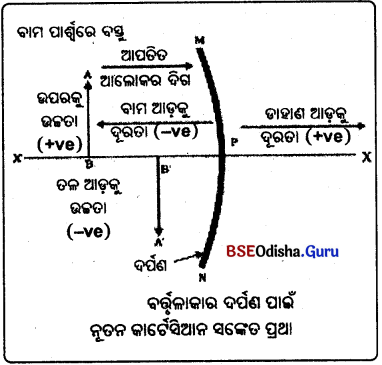
ଆଦୃତ ସଙ୍କେତ ଓ ପ୍ରଥାଗୁଡ଼ିକ ହେଲା :
- ବସ୍ତୁକୁ ସର୍ବଦା ଦର୍ପଣର ବାମପାର୍ଶ୍ଵରେ ରଖାଯାଏ ।
- ପ୍ରମୁଖ ଅକ୍ଷ ସହିତ ସମାନ୍ତର ରହିଥିବା ଦୂରତାଗୁଡ଼ିକୁ ଦର୍ପଣର ପୋଲ୍ ଠାରୁ ମପାଯାଏ ।
- ଯେଉଁ ଦୂରତାକୁ ମୂଳ ବିନ୍ଦୁର ଡାହାଣ ଆଡ଼କୁ + X ଅକ୍ଷ ଦିଗରେ ମପାଯାଏ ତାହାକୁ ଯୁକ୍ତାତ୍ମକ ଓ ଯାହା ମୂଳବିନ୍ଦୁର ବାମ ଆଡ଼କୁ -X ଅକ୍ଷ ଦିଗରେ ମପାଯାଏ ତାହାକୁ ବିଯୁକ୍ତାତ୍ମକ ନିଆଯାଏ ।
- ପ୍ରମୁଖ ଅକ୍ଷର ଉପର ଆଡ଼କୁ +Y ଅକ୍ଷ ଦିଗରେ ଲମ୍ବ ଭାବରେ ଯେଉଁ ଦୂରତା ବା ଉଚ୍ଚତା ମପାଯାଏ ତାହାକୁ ଯୁକ୍ତାତ୍ମକ ନିଆଯାଏ ।
- ପ୍ରମୁଖ ଅକ୍ଷର ଚଳ ଆଡ଼କୁ –Y ଅକ୍ଷ ଦିଗରେ ଲମ୍ବଭାବରେ ଯେଉଁ ଦୂରତା ମପାଯାଏ ତାହାକୁ ବିଯୁକ୍ତାତ୍ମକ ନିଆଯାଏ ।
ଦର୍ପଣର ସୂତ୍ର :
ଏକ ବର୍ତ୍ତୁଳାକାର ଦର୍ପଣରେ ପୋଠାରୁ ବସ୍ତୁର ଦୂରତା ‘u’, ପୋଠାରୁ ପ୍ରତିବିମ୍ବର ଦୂରତା ‘v’ ସଙ୍କେତଦ୍ଵାରା, ପୋଲଠାରୁ ଫୋକସ୍ ଦୂରତାକୁ ‘f’ ଦ୍ଵାରା ପ୍ରକାଶ କରାଯାଏ ।
\(\frac { 1 }{ v }\) + \(\frac { 1 }{ u }\) = \(\frac { 1 }{ f }\) ଏହାକୁ ଦର୍ପଣର ସୂତ୍ର କୁହାଯାଏ ।
ପରିବର୍ଦ୍ଧନ :
ପ୍ରତିବିମ୍ବର ଉଚ୍ଚତା (h’)ଓ ବସ୍ତୁର ଉଚ୍ଚତା (h) ର ଅନୁପାତକୁ ପରିବର୍ଜନ (m) କୁହାଯାଏ ।
m = \(\frac { h’ }{ h }\) = \(\frac { -v }{ u }\)

2. ଆୟତାକାର କାଚ ସ୍ଲାବ୍ ମଧ୍ୟରେ ପ୍ରତିସରଣର ପରୀକ୍ଷା କରି ପରୀକ୍ଷାଲବ୍ଧ ତଥ୍ୟ ଲେଖ । ଜଳରେ ଆଲୋକର ବେଗ 2 .25 x 108 m/s ହେଲେ ଜଳର ପ୍ରତିସରଣାଙ୍କ ନିର୍ଣ୍ଣୟ କର । ଶୂନ୍ୟରେ ଆଲୋକର ବେଗ 3 x 108 m/s
ଉ–
ଆବଶ୍ୟକ ଉପକରଣ :
ଧଳା କାଗଜ ଫର୍ଦ୍ଦ, ଡ୍ରଇଂବୋର୍ଡ଼, ଡ୍ରଇଂପିନ୍, ଚାରୋଟି ଆଲପିନ୍, ମୁନିଆ ପେନ୍ସିଲ୍, ସ୍କେଲ, ଆୟତଘନାକାର କାଚ ସ୍ଲାବ୍ ।
ପର1କ୍ଷଣ :
- ତ୍ରଇଂ ବୋର୍ଡ଼ ଭପରେ ଏକ ଧଳା କାଖଜଫଦକୁ ଡ୍ରଇଂ ପିଦ୍ଵାରା ଲଗାଯାଉ । ଆୟତଘନାକାର କାଚ କ୍ଲବ୍କୁ କାଗଜ ମଝିରେ ରଖ୍ ବାହ୍ୟ ସୀମାରେଖାକୁ ପେନ୍ସିଲ୍ ସାହାଯ୍ୟରେ ଅଙ୍କନ କରି ABCD ନାମ ଦିଆଯାଉ ।
- କାଗଜ ଉପରେ E ଓ F ନାମକ ଦୁଇଟି ପିନ୍ ଭୂଲମ୍ବ ଭାବରେ ପୋତ ଯେପରିକି E ଓ F ର ମୁନକୁ ଯୋଗ କରୁଥିବା ରେଖା AB ଧାର ପ୍ରତି ତୀର୍ଯ୍ୟକ ହେବ ।
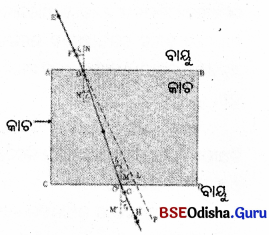
- କ୍ଲବ୍ର ଅପର ପାର୍ଶ୍ବରେ G ଓ H ନାମକ ଆଉ ଦୁଇଟି ପିନ୍ କାଗଜ ଉପରେ ଲମ୍ବ ଭାବରେ ଏପରି ପୋତ ଯେପରିକି E ଓ F ପିଦ୍ଵୟର ମୂଳର ପ୍ରତିବିମ୍ବ G ଓ H ପିନର ମୂଳଦ୍ଵୟ ଗୋଟିଏ ସରଳରେଖାରେ ରହିବେ ।
- କାଗଜ ଉପରୁ ସବୁ ପିନ୍ ଓ ସ୍ଲାବ୍ କାଢ଼ିଦେଇ E ଓ Fର ସ୍ଥିତି ସୂଚିତ କରୁଥିବା ବିନ୍ଦୁକୁ କାଗଜ ଉପରେ ଯୋଗକରି ସରଳରେଖା ଅଙ୍କନ କଲେ ତାହା AB ଧାରକୁ ଠ ବିନ୍ଦୁରେ ସ୍ପର୍ଶ କରିବ । G ଓ H ପିନ୍ର ସ୍ଥିତି ସୂଚିତ କରୁଥିବା ବିନ୍ଦୁ ଦୁଇଟିକୁ ଯୋଗକରି ସରଳରେଖା ଅଙ୍କନ କଲେ ତାହା CD ଧାରକୁ ଠା’ ବିନ୍ଦୁରେ ସ୍ପର୍ଶ କରିବ ।
- O ଓ ଠି’କୁ କାଗଜ ଉପରେ ଯୋଗ କରାଯାଉ ଏବଂ \(\vec{EF}\) କୁ ବର୍ଦ୍ଧିତ କରାଯାଉ ଏବଂ P ବିନ୍ଦୁ ପର୍ଯ୍ୟନ୍ତ ବିନ୍ଦୁକିତ ରେଖାଦ୍ଵାରା ବଦ୍ଧିତ କରାଯାଉ ।
- ଠ ଓ ଠ’ ଠାରେ ଯଥାକ୍ରମେ ଅଭିଲମ୍ବ NN’ ଓ MM’ ଅଙ୍କନ କରାଯାଉ ।
ପର୍ଯ୍ୟବେକ୍ଷଣ :
- ଠ ଠାରେ ଆଲୋକ ରଶ୍ମି ବାୟୁରୁ କାଚ ମଧ୍ୟକୁ ପ୍ରବେଶ କରି NN’ ଅଭିଲମ୍ବ ଆଡ଼କୁ ବଙ୍କେଇ ଯାଇଛି ।
- ଠ’ ଠାରେ ଆଲୋକ ରଶ୍ମି କାଚରୁ ବାୟୁକୁ ପ୍ରବେଶ କରିଛି ଏବଂ ଅଭିଲମ୍ବଠାରୁ ଦୂରେଇ ଯାଇଛି ।
- ନିର୍ଗତ କୋଣ r2, ଆପତିତ କୋଣ i ସହ ସମାନ
∠r2 = ∠i |
ସିଦ୍ଧାନ୍ତ
(i) EO ହେଉଛି ଆପତିତ ରଶ୍ମି, ୦୦’ ହେଉଛି ପ୍ରତିସୃତ ରଶ୍ମି, O’H ହେଉଛି ନିର୍ଗତ ରଶ୍ମି ।
(ii) ନିର୍ଗତ ରଶ୍ମି O’H ଆପତିତ ରଶ୍ମି EO ସହ ସମାନ୍ତର । କାରଣ ଆୟତାକାର କାଚ କ୍ଲବ୍ର ଦୁଇଟି ସମାନ୍ତର ପୃଷ୍ଠ AB ଓ.CDରେ ଆଲୋକ ରଶ୍ମି ବାଙ୍କିଯିବାର ପରିମାଣ ସମାନ ଓ ବିପରୀତ ।
(iii) ଆଲୋକ ରଶ୍ମି ଗୋଟିଏ ପାର୍ଶ୍ଵକୁ ବିସ୍ଥାପିତ ହୋଇଥାଏ । ବଦ୍ଧିତ ଆପତିତ ରଶ୍ମି ଓ ନିର୍ଗତ ରଶ୍ମି ମଧ୍ୟରେ ଥିବା ବ୍ୟବଧାନ ଜ୍ୱରଵ୍ଵକୁ ପାର୍ଶ୍ଵ ବିସ୍ଥାପନ କହନ୍ତି |
V = 2.25 × 108 m/s
C = 3 x 108 m/s, n = 660 ?
n = \(\frac { C }{ v }\)

3. ପ୍ରତିସରଣ ନିୟମଗୁଡ଼ିକ ଲେଖ । ନିୟମରୁ ପ୍ରତିସରଣାଙ୍କ କହିଲେ କ’ଣ ବୁଝ ଉଦାହରଣ ସହ ଲେଖ । ଏକ ମାଧ୍ୟମରେ ପ୍ରତିସରଣାଙ୍କ ଓ ଆଲୋକର ବେଗ ମଧ୍ଯରେ ସମ୍ପର୍କ ନିଗମନ କର ।
ଉ-
ଆଲୋକର ପ୍ରତିସରଣ : ଆଲୋକ ଗୋଟିଏ ସ୍ଵଚ୍ଛ ମାଧ୍ୟମରୁ ଆଉ ଏକ ସ୍ଵଚ୍ଛ ମାଧ୍ୟମକୁ ତୀର୍ଯ୍ୟକ ଭାବରେ ପ୍ରବେଶ କଲେ, ତାହାର ସଞ୍ଚାରଣ ଦିଗ ଦ୍ବିତୀୟ ମାଧ୍ୟମରେ ବଦଳିଯାଏ, ଏହାକୁ ଆଲୋକର ପ୍ରତିସରଣ କୁହାଯାଏ ।
ପ୍ରତିସରଣର ପ୍ରଥମ ନିୟମ :
ଆପତିତ ରଶ୍ମି, ପ୍ରତିସୃତ ରଶ୍ମି ଓ ଆପତନ ବିନ୍ଦୁରେ ଦୁଇଟି ସ୍ଵଚ୍ଛ ମାଧ୍ୟମର ବ୍ୟବଧାନ ପୃଷ୍ଠ ପ୍ରତି ଅଙ୍କିତ ଅଭିଲମ୍ବ ଏକ ସମତଳରେ ଅବସ୍ଥାନ କରିବେ । ପୃଷ୍ଠ ପ୍ରତି ଅଙ୍କିତ ଅଭିଲମ୍ବ ଏକ ସମତଳରେ ଅବସ୍ଥାନ କରିବେ ।
ପ୍ରତିସରଣର ଦ୍ବିତୀୟ ନିୟମ : ଦୁଇଟି ନିର୍ଦ୍ଦିଷ୍ଟ ମାଧ୍ୟମ ଓ ଗୋଟିଏ ନିର୍ଦ୍ଦିଷ୍ଟ ବର୍ଷର ଆଲୋକ ପାଇଁ ଆପତନ କୋଣର ସାଇନ୍ (sine) ଓ ପ୍ରତିସରଣ କୋଣର ସାଇନ୍ (sine)ର ଅନୁପାତ ଏକ ସ୍ଥିରାଙ୍କ ।
ପ୍ରତିସରଣାଙ୍କ :
(a) ଆପତନ କୋଣ
- ପ୍ରତିସରଣ କୋଣ ‘r’ ହେଲେ ସ୍କେଲଙ୍କ ନିୟମ ଅନୁଯାୟୀ \(\frac{\sin i}{\sin r}\) ସ୍ଥିରାଙ୍କ |
ଏହାକୁ ପ୍ରଥମ ମାଧ୍ୟମ ତୁଳନାରେ ଦ୍ଵିତୀୟ ମାଧ୍ୟମର ପ୍ରତିସରଣାଙ୍କ କୁହାଯାଏ ।
- ଯଦି ଆଲୋକ ରଶ୍ମି ବାୟୁରୁ କାଚ ମଧ୍ୟରେ ପ୍ରବେଶ କରେ, ତେବେ \(\frac{\sin i}{\sin r}\) କୁ ବାୟୁ ତୁଳନାରେ କାରର ପ୍ରତିସରଣୀଙ୍କ କହନ୍ତି ।
- ଯଦି ଆଲୋକ ରଶ୍ମି ଶୂନ୍ୟରୁ କାଚ ମଧ୍ଯରେ ପ୍ରବେଶ କରେ ତେବେ \(\frac{\sin i}{\sin r}\) କୁ ଶୂନ୍ୟ ତୁଳନାରେ କାରର ପ୍ରତିସରଣୀଙ୍କ କୁହାଯାଏ ।
- ଯଦି ଆଲୋକ ରଶ୍ମି କାଚରୁ ବାୟୁ ମଧ୍ୟରେ ପ୍ରବେଶ କରେ ତେବେ \(\frac{\sin i}{\sin r}\) କୁ କାଢ ତୁଳନାରେ ବାୟୁର ପ୍ରତିସରଣୀଙ୍କ କୁହାଯାଏ ।
(b) ପ୍ରତିସରଣାଙ୍କ ଏକକ ବିହୀନ ।
ଏକ ମାଧ୍ୟମରେ ପ୍ରତିସରଣାଙ୍କ ଓ ଆଲୋକର ବେଗ ମଧ୍ୟରେ ସମ୍ପର୍କ :
ମନେକର ଆଲୋକ ରଶ୍ମି ବାୟୁ ମାଧ୍ୟମରୁ କାଚ ମାଧ୍ୟମକୁ ପ୍ରବେଶ କରୁଛି । ବାୟୁ ଓ କାଚରେ ଆଲୋକର ବେଗ ଯଥା କ୍ରମେ v1 ଓ v2 ବେଳେ
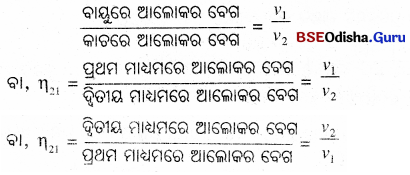
4. ବର୍ତ୍ତୁଳାକାର ଦର୍ପଣଦ୍ୱାରା ପ୍ରତିବିମ୍ବ କିପରି ଗଠିତ ହୁଏ ସେଥିପାଇଁ ଏକ ସରଳ ପରୀକ୍ଷଣ ଦର୍ଶାଅ । ବସ୍ତୁର ବିଭିନ୍ନ ସ୍ଥିତି ଅନୁଯାୟୀ ପ୍ରତିବିମ୍ବର ସ୍ଥିତି, ଆକାର ଓ ପ୍ରକୃତିଗୁଡ଼ିକ ଲେଖ ।
ଉ-
ଆବଶ୍ୟକ ଉପକରଣ : ଅବତଳ ଦର୍ପଣ, ମିଟର ସ୍କେଲ୍, ଚକ୍ଖଣ୍ଡ, ଜଳନ୍ତା ମହମବତୀ, କାଗଜ, ପରଦା ।
ସଜ୍ଜ1କରଣ :
- ଗୋଟିଏ ଅବତଳ ଦର୍ପଣ ନିଅ । ଏହାର ଫୋକସ୍ ଦୂରତାର ସନ୍ନିକଟ ମାନ ନିର୍ଣ୍ଣୟ କର ।
- ଟେବୁଲ୍ ଉପରେ ଚଦ୍ଵାରା ଏକ ରେଖା ଅଙ୍କନ କରାଯାଉ ।
- ଏକ ଅବତଳ ଦର୍ପଣକୁ ଷ୍ଟାଣ୍ଡରେ ଲଗାଯାଇ ରେଖା ଉପରେ ଏପରି ରଖ ଯେମିତିକି ଦର୍ପଣର ପୋଲ ଠିକ୍ ରେଖା
- ପୂର୍ବରେଖା ସହିତ ସମାନ୍ତର ଭାବେ ଆଉ ଦୁଇଟି ରେଖା ଟାଣ ଯେପରିକି ପାଖାପାଖୁ ଯେକୌଣସି ଦୁଇଟି ରେଖା ମଧ୍ୟରେ ଦୂରତା ଦର୍ପଣର ଫୋକସ୍ ଦୂରତା ସହିତ ସମାନ ହେବ ।
- ଉକ୍ତରେଖାର ସ୍ଥିତି ବର୍ତ୍ତମାନ ଦର୍ପଣର ପୋଲ (P) ଫୋକସ୍ବିନ୍ଦୁ (F) ଓ ବକ୍ରତାକେନ୍ଦ୍ର (C) ଭେଦ କରିବ, କାରଣ କ୍ଷୁଦ୍ର ଦ୍ବାରକ ବିଶିଷ୍ଟ ବର୍ତ୍ତୁଳାକାର ଦର୍ପଣର ଫୋକସ୍ ବିନ୍ଦୁ (F) ଓ ତା’ର ପୋଲ (P) ଓ ବକ୍ରତାକେନ୍ଦ୍ର (C) ର ମଝିରେ ଥାଏ ।
- ଜଳୁଥିବା ମହମବତୀ ନେଇ ୯ ବିନ୍ଦୁର ପଛକୁ ଦୂରରେ ରଖ । ଦର୍ପଣ ସମ୍ମୁଖରେ ଏକ କାଗଜ ପରଦା ରଖ । ପରଦାକୁ ଆଗପଛ କରି ଯେଉଁ ସ୍ଥାନରେ ଉଜ୍ଜ୍ବଳ, ତୀକ୍ଷ୍ଣ ପ୍ରତିବିମ୍ବ ସୃଷ୍ଟି ହେବ ସେଠାରେ ପରଦାକୁ ସ୍ଥିର ରଖ୍ ବସ୍ତୁର ତା’ର ପ୍ରତିବିମ୍ବର ପ୍ରକୃତି ଓ ସ୍ଥିତିକୁ ଲେଖ୍ ରଖ ।
- ମହମବତୀର ଆକାର ସହିତ ପ୍ରତିବିମ୍ବର ଆକାର ତୁଳନା କର । ଜଳନ୍ତା ମହମବତୀକୁ ବିଭିନ୍ନ ସ୍ଥାନରେ ଯଥା :
- C ଠାରୁ ଅଳ୍ପ ଦୂରରେ
- ଠିକ୍ C ଉପରେ
- F ଓ C ମଧ୍ୟରେ
- ଠିକ୍ F ଉପରେ
- P ଓ F ମଧ୍ୟରେ ରଖ୍ ପ୍ରତିବିମ୍ବର ଅବସ୍ଥାନ ଓ ପ୍ରକୃତି ନିର୍ଣ୍ଣୟ କର ।
ପର୍ଯ୍ୟବେକ୍ଷଣ :
- ଅବତଳ ଦର୍ପଣଦ୍ୱାରା ସୃଷ୍ଟି ହେଉଥିବା କୌଣସି ବସ୍ତୁର ପ୍ରତିବିମ୍ବର ପ୍ରକୃତି, ଅବସ୍ଥାନ ଓ ଆକାର ଦର୍ପଣ ସମ୍ମୁଖରେ ସେହି ବସ୍ତୁର ଅବସ୍ଥାନ ଉପରେ ନିର୍ଭର କରେ ।
- ବସ୍ତୁର ଅବସ୍ଥାନକୁ P, F ଓ C ବିଦୁ୍ୟତ୍ରୟକୁ ଭିତ୍ତିକରି ପ୍ରକାଶ କରାଯାଏ ।
- ବସ୍ତୁର କିଛି ଅବସ୍ଥାନ ପାଇଁ ପ୍ରତିବିମ୍ବ ବାସ୍ତବ ବା ଆଭାସୀ ହୁଏ । ଏହା ସଳଖ ବା ଓଲଟା କିମ୍ବା ବସ୍ତୁ ସହ ସମାନ, ଛୋଟ ବା ବଡ଼ ହୋଇ ପାରେ ।

ସଂକ୍ଷିପ୍ତ ଭତ୍ତରମୂଳକ ପ୍ରଶ୍ନୋତ୍ତର
1. ଗୋଟିଏ ବର୍ତ୍ତୁଳ ଦର୍ପଣରେ ଗୋଟିଏ ବସ୍ତୁ କେତେ ଦୂରରେ ରଖିଲେ ଏହାର ପ୍ରତିବିମ୍ବ 40 cm ଦୂରରେ ଏକ ପରଦାରେ ସୃଷ୍ଟି ହେବ ଓ ପ୍ରତିବିମ୍ବର ପରିବଦ୍ଧର୍ନ -1 ହେବ ?
ପ୍ରତିବିମ୍ବଟି ପରଦାରେ ସୃଷ୍ଟି ହେଉଥିବାରୁ ପ୍ରତିବିମ୍ବଟି ବାସ୍ତବ ଏବଂ ଦର୍ପଣଟି ଅବତଳ ଦର୍ପଣ |
V = – 40 cm, m = \(\frac { -v }{ u }\) = -1 ⇒ \(\frac { -(-40) }{ u }\) = – 1 ⇒ u = – 40 cm.
m = – 1 ହେତୁ ବସ୍ତୁ ଓ ପ୍ରତିବିମ୍ବ ଉଚ୍ଚତା ସମାନ ।
ତେଣୁ ବସ୍ତୁଟି ବକ୍ରତା କେନ୍ଦ୍ରଠାରେ ଅଛି ।
R = – 40 cm.
f = \(\frac { -40 }{ 2 }\) = – 20 cm
ଦର୍ପଣର ଫୋକସ୍ ଦୂରତା = 20 cm.
2. ଜଳ, ଆଲ୍କହଲ୍ ଓ ବେଞ୍ଜିନ୍ର ପ୍ରତିସରଣାଙ୍କ ଯଥାକ୍ରମେ 1.33, 1.36 ଓ 1.50 । ସେମାନଙ୍କ ମଧ୍ୟରେ ଆଲୋକର ବେଗ ନିର୍ଣ୍ଣୟ କର । କେଉଁଥରେ ଆଲୋକର ବେଗ ସର୍ବନିମ୍ନ ଓ ସର୍ବାଧିକ ଲେଖ । (ଶୂନ୍ୟରେ ଆଲୋକର ବେଗ = 3 x 108 ସେ.ମି. )
ଉ-
ଶୂନ୍ୟରେ ଆଲୋକର ବେଗ = 3 x 108 m/s
ଜଳରେ ଆଲୋକର ବେଗ v1 |

(ii) ଆଲ୍କହଲ୍ରେ ଆଲୋକର ବେଗ V2 ହେଲେ,

(iii) ବେଞ୍ଜିନ୍ରେ ଆଲୋକର ବେଗ V3

∴ ଜଳରେ ଆଲୋକର ବେଗ ସର୍ବାଧିକ ଓ ବେଞ୍ଜିନ୍ରେ ଆଲୋକର ବେଗ ସର୍ବନିମ୍ନ ।
30 cm ଫୋକସ୍ ଦୂରତା ବିଶିଷ୍ଟ ଗୋଟିଏ ଅବତଳ ଲେନ୍ସ 20 cm ଦୂରରେ ପ୍ରତିବିମ୍ବ ସୃଷ୍ଟି କରେ । ଲେନ୍ସଠାରୁ କେତେ ଦୂରରେ ବସ୍ତୁଟି ଅଛି ? ରଶ୍ମି ଚିତ୍ର ଅଙ୍କନ କରି ପ୍ରତିବିମ୍ବକୁ ଦେଖାଅ ।
ଉ-
f’ = Φ – 30 cm, y = – 20 cm.
ଲେନ୍ସ ସୂତ୍ର ଅନୁଯାୟୀ,
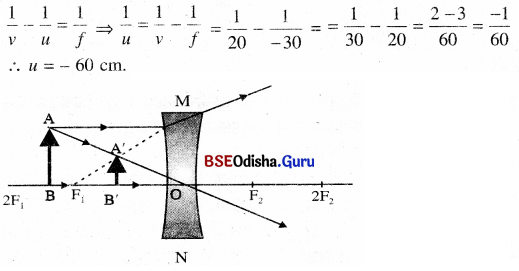
ସୁତରାଂ ବସ୍ତୁଟି ଲେନ୍ସଠାରୁ –60 cm ଦୂରରେ ବା 2F ଠାରେ ଅବସ୍ଥିତ ।
4. 30 cm ଫୋକସ୍ ଦୂରତା ବିଶିଷ୍ଟ ଏକ ଉତ୍ତଳ ଲେନ୍ସଠାରୁ 20 cm ଦୂରରେ 10 cm ଉଚ୍ଚତାବିଶିଷ୍ଟ ଏକ ବସ୍ତୁ ଅଛି । ଏହାର ପ୍ରତିବିମ୍ବର ଦୂରତା, ପ୍ରକୃତି ଓ ପ୍ରତିବିମ୍ବର ଉଚ୍ଚତା ନିର୍ଣ୍ଣୟ କର ।
ଉ –
h = 10 cm, u = – 20 cm, f = + 30 cm, v = କେତେ ? h’ = କେତେ ?
ଲେନ୍ସର ସୂତ୍ର ଅନୁଯାୟୀ \(\frac { 1 }{ v }\) – \(\frac { 1 }{ u }\) = \(\frac { 1 }{ f }\)
\(\frac { 1 }{ v }\) = \(\frac { 1 }{ f }\) + \(\frac { 1 }{ u }\) = \(\frac { 1 }{ 30 }\) + \(\frac { 1 }{ -20 }\) = – \(\frac { 1 }{ 60 }\)
v = – 60cm
m = \(\frac { h’ }{ h }\) = \(\frac { v }{ u }\) ⇒ m = \(\frac { h’ }{ 10 }\) = \(\frac { -60 }{ -20 }\)
ଆଭାସୀ, ସଳଖ ଓ ପରିବର୍ଦ୍ଧିତ ପ୍ରତିବିମ୍ବ ସୃଷ୍ଟି ହେବ ।
5. +2D ଓ – 4D ପାୱାର ବିଶିଷ୍ଟ ଲେନ୍ସ ଦ୍ବୟର ଫୋକସ୍ ଦୂରତା ନିଶ୍ଚୟ କର । – 4D ପାଓ୍ବାର ବିଶିଷ୍ଟ ଲେନ୍ସ୍ରୁ 100 ମି. ଦୂରରେ ଥିବା ବସ୍ତୁର ଲେନ୍ସଠାରୁ ପ୍ରତିବିମ୍ବର ଦୂରତା ନିର୍ଣ୍ଣୟ କର ।
ଉ –
- ଉତ୍ତଳ ଲେନ୍ସର ଫୋକ୍ସ ଦୂରତା : = f = \(\frac { 1 }{ D }\) = \(\frac { 1 }{ 2 }\)m = 50 cm
- ଅବତଳ ଲେନ୍ସର ଫୋକସ୍ ଦୂରତା = f = \(\frac { 1 }{ D }\) = \(\frac { 1 }{ 4 }\) ମି. = – 25 cm
- P = – 4D, u = 100 cm, v = ?
ଲେନ୍ସ ସୂତ୍ର ଅନୁଯାୟୀ, \(\frac { 1 }{ v }\) – \(\frac { 1 }{ u }\) = \(\frac { 1 }{ f }\), \(\frac { 1 }{ u }\) = \(\frac { 1 }{ -25 }\) + \(\frac { 1 }{ -100 }\) = \(\frac { -5 }{ 100 }\) = – \(\frac { 1 }{ 20 }\)
v = – 20 cm.
6. ସଙ୍କେତ ପ୍ରଥା କ’ଣ ? ଲେନ୍ସ ପାଇଁ ସଙ୍କେତ ପ୍ରଥାଗୁଡ଼ିକ ଲେଖ ।
ଉ –
- ବସ୍ତୁର ଦୂରତା, ପ୍ରତିବିମ୍ବର ଦୂରତା, ବସ୍ତୁର ଉଚ୍ଚତା, ପ୍ରତିବିମ୍ବର ଉଚ୍ଚତା ଓ ଲେନ୍ସର ଫୋକସ୍ର ଦୈର୍ଘ୍ୟକୁ ସଙ୍କେତ ଦେବାପାଇଁ ବ୍ୟବହୃତ ନିୟମର ସମାହାରକୁ ସଙ୍କେତ ପ୍ରଥା କୁହାଯାଏ ।
- ବସ୍ତୁର ଦୂରତା (u), ପ୍ରତିବିମ୍ବର ଦୂରତା (v) ଓ ଫୋକସ୍ ଦୂରତା (f), ଲେନ୍ସର ଆଲୋକ କେନ୍ଦ୍ର ‘O’ ଠାରୁ ମପାଯାଏ ।
- ବସ୍ତୁ ଓ ପ୍ରତିବିମ୍ବର ସମସ୍ତ ଦୂରତା (ଉଚ୍ଚତା )କୁ ମୁଖ୍ୟ ଅକ୍ଷ ଉପରେ ଯୁକ୍ତାତ୍ମକ ଭାବେ ଓ ମୁଖ୍ୟ ଅକ୍ଷତଳେ ବିଯୁକ୍ତାତ୍ମକ ଭାବେ ନିଆଯାଏ ।
7. ବର୍ତ୍ତୁଳାକାର ଦର୍ପଣରେ ପ୍ରତିଫଳନ ପାଇଁ ପ୍ରଚଳିତ ସଙ୍କେତ ପ୍ରଥା ଉଲ୍ଲେଖ କର ।
ଉ –
- ବସ୍ତୁକୁ ସର୍ବଦା ଦର୍ପଣର ବାମ ପାର୍ଶ୍ଵରେ ରଖାଯାଏ । ପ୍ରମୁଖ ଅକ୍ଷ ସହିତ ସମାନ୍ତର ରହିଥି ଦୂରତାଗୁଡ଼ିକୁ ଦର୍ପଣର ପୋଠାରୁ ମପାଯାଏ ।
- ଯେଉଁ ଦୂରତାକୁ ମୂଳବିନ୍ଦୁର ଡାହାଣ ଆଡ଼କୁ X- ଅକ୍ଷ ଦିଗରେ ମପାଯାଏ, ତାହାକୁ ଯୁକ୍ତାତ୍ମକ ଓ ଯାହା ମୂଳବିନ୍ଦୁର ବାମ ଆଡ଼କୁ X-ଅକ୍ଷ ଉପରେ ମପାଯାଏ, ତାହାକୁ ବିଯୁକ୍ତାତ୍ମକ ନିଆଯାଏ ।
- ପ୍ରମୁଖ ଅକ୍ଷର ଉପର ଆଡ଼କୁ Y ଅକ୍ଷ ଦିଗରେ ଲମ୍ବ ଭାବରେ ଯେଉଁ ଦୂରତା ବା ଉଚ୍ଚତା ମପାଯାଏ, ତା’କୁ ଯୁକ୍ତାତ୍ମକ ଓ ପ୍ରମୁଖ ଅକ୍ଷର ତଳଆଡ଼କୁ Y-ଅକ୍ଷ ଦିଗରେ ଲମ୍ବ ଭାବରେ ଯେଉଁ ଦୂରତା ମପାଯାଏ, ତାହାକୁ ବିଯୁକ୍ତାତ୍ମକ ନିଆଯାଏ ।
8. ଲେନ୍ସର ପାୱାର କହିଲେ କ’ଣ ବୁଝ ? ଗୋଟିଏ ଅବତଳ ଓ ଗୋଟିଏ ଉତ୍ତଳ ଲେନ୍ସର ଫୋକସ୍ ଦୂରତା 50 em ହେଲେ ତାହାର ପାୱାର କେତେ ?
ଉ –
(i)
ଲେନ୍ସଦ୍ଵାରା ହେଉଥିବା ଅଭିସାରଣ ଓ ଅପସାରଣର ମାତ୍ରାକୁ ଲେନ୍ସର ପାୱାର କହନ୍ତି । ଏହା ଫୋକସ୍ ଦୂରତାଦ୍ଵାରା ନିର୍ଦ୍ଧାରିତ ହୁଏ । ତେଣୁ ଗୋଟିଏ ଲେନ୍ସର ଫୋକସ୍ ଦୂରତାର ବିଲୋମୀକୁ ଲେନ୍ସର ପାୱାର କୁହାଯାଏ । P = \(\frac { 1 }{ f }\) |
(ii) ଉତ୍ତଳ ଲେନ୍ସର ଫୋକସ୍ ଦୂରତା f = 50 cm.
P = \(\frac { 1 }{ f }\) = \(\frac { 1 }{ 50 }\) = + 2D
(iii) ଅବତଳ ଲେନ୍ସର ଫୋକସ୍ ଦୂରତା f = – 50 cm
P = \(\frac { 1 }{ f }\) = \(\frac { 1 }{ -50 }\) = -2D
9. ଲୋକର ପ୍ରତିଫଳନ କ’ଣ ? ଏହାର ନିୟମଦ୍ଵୟ ଲେଖ ।
ଉ – ଏକ ଚିକ୍କଣ ଅସ୍ବଚ୍ଛ ପୃଷ୍ଠ ଉପରେ ଆଲୋକ ପଡ଼ିଲେ ତାହାର ଅଧିକାଂଶ ଭାଗ ପ୍ରତିଫଳିତ ହୋଇ ଫେରିଯାଏ । ଆଲୋକର ଗତିପଥରେ ଏକ ପ୍ରକାର ପରିବର୍ତ୍ତନକୁ ପ୍ରତିଫଳନ କୁହାଯାଏ ।
ପ୍ରତିଫଳନର ନିୟମ :
- ଆପତିତ ରଶ୍ମି, ପ୍ରତିଫଳିତ ରଶ୍ମି ଓ ଆପତନ ବିନ୍ଦୁରେ ପ୍ରତିଫଳନ ପୃଷ୍ଠ ପ୍ରତି ଅଙ୍କିତ
- ଆପତନ କୋଣ ଓ ପ୍ରତିଫଳନ କୋଣ ସମାନ ହୋଇଥାଏ । ପ୍ରତିଫଳନର ଏହି ନିୟମଗୁଡ଼ିକ ପ୍ରତିଫଳକର ବଜ୍ରପୃଷ୍ଠତଳ ସମେତ ଯେକୌଣସି ପୃଷ୍ଠତଳ ପାଇଁ ପ୍ରଯୁଜ୍ୟ ଅଟେ ।
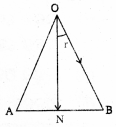

10. ଲେନ୍ସ କ’ଣ ? ଏହାର ଅଭିସାରୀ ଓ ଅପସାରୀ ଧର୍ମ କ’ଣ ? ଏହି ଧର୍ମମାନଙ୍କର ପରିମାଣ ଲେନ୍ସର କେଉଁ ଲକ୍ଷଣ ଉପରେ ନିର୍ଭର କରେ ବୁଝାଅ ।
ଉ –
- ଦୁଇଟି ପୃଷ୍ଠଥିବା ଏକ ସ୍ବଚ୍ଛ ପ୍ରତିସରଣକାରୀ ମାଧ୍ୟମରେ ଗୋଟିଏ ପୃଷ୍ଠ ବା ଉଭୟ ପୃଷ୍ଠ ବକ୍ର ହୋଇଥିଲେ ତାକୁ ଲେନସ୍ କହନ୍ତି ।
- ଉତ୍ତଳ ଲେନ୍ସର ମଝିଅଂଶ ଧାର ଅଂଶଠାରୁ ଅଧିକ ମୋଟା ହୋଇଥାଏ । ଉତ୍ତଳ ଲେନ୍ସରେ ଆଲୋକ ରଶ୍ମିଗୁଚ୍ଛ ଲେନସ୍ ମଝିଆଡ଼କୁ (କେନ୍ଦ୍ରାଭିମୁଖୀ) ଗତିକରେ । ଏହି ଧର୍ମକୁ ଅଭିସାରୀ ଧର୍ମ କହନ୍ତି । ତେଣୁ ଉତ୍ତଳ ଲେନ୍ସକୁ କେନ୍ଦ୍ରାଭିମୁଖୀ ବା ଅଭିସାରୀ ଲେନ୍ସ କହନ୍ତି ।
- ଲେନ୍ସର ଦୁଇଟି ବର୍ତ୍ତୁଳାକାର ପୃଷ୍ଠ ଭିତର ଆଡ଼କୁ ପଶିଯାଇଥାଏ । ତେଣୁ ତାକୁ ଦ୍ବିଅବତଳ ଲେନ୍ସ କହନ୍ତି ।. ଏହାର ଧାର ଅଂଶ ମଝିଠାରୁ ମୋଟା । ଏହି ଲେନ୍ସର ଆଲୋକ ରଶ୍ମି ଧାର ଆଡ଼କୁ ବଙ୍କାଇଥାଏ । ଏହି ଧର୍ମକୁ ଅଭିସାରୀ ଧର୍ମ ଏବଂ ଲେନ୍ସକୁ ଅଭିସାରୀ ଲେନ୍ସ କହନ୍ତି ।
- ଲେନ୍ସର ଅଭିସାରୀ ଓ ଅପସାରୀ ଧର୍ମର ପରିମାଣ ଲେନ୍ସର ପାୱାର ଉପରେ ନିର୍ଭର କରେ ।
11. ଉତ୍ତଳ ଦର୍ପଣଠାରୁ ବସ୍ତୁକୁ ଘୁଞ୍ଚାଇନେଲେ ପ୍ରତିବିମ୍ବର ଅବସ୍ଥିତି ଓ ଆକାର କିପରି ବଦଳିଥାଏ ବୁଝାଅ ।
ଉ –
- ଉତ୍ତଳ ଦର୍ପଣଠାରୁ ବସ୍ତୁକୁ ଘୁଞ୍ଚାଇ ନେଇ ଅନନ୍ତ ଦୂରତାରେ ରଖିଲେ ପ୍ରତିବିମ୍ବ ଫୋକସ୍ରେ ଗଠିତ ହେବ । ଅତ୍ୟନ୍ତ କ୍ଷୁଦ୍ର ବିନ୍ଦୁସମ ଆଭାସୀ ଓ ସଳଖ ପ୍ରତିବିମ୍ବ ଗଠିତ ହୁଏ ।
- ଉତ୍ତଳ ଦର୍ପଣଠାରୁ ବସ୍ତୁକୁ ଘୁଞ୍ଚାଇ ଫୋକସ୍ଠାରେ ରଖିଲେ ପ୍ରତିବିମ୍ବ ଦର୍ପଣର ପଛପଟେ P ଓ F ମଧ୍ୟରେ ଗଠିତ ହୁଏ । ପ୍ରତିବିମ୍ବଟି ସଳଖ ଓ କ୍ଷୁଦ୍ର ହୁଏ ।
- ଉତ୍ତଳ ଦର୍ପଣଠାରୁ ବସ୍ତୁକୁ ଘୁଞ୍ଚାଇ ନେଇ ଦର୍ପଣର ପୋଲ୍ ଓ ଫୋକସ୍ ଦୂରତା ମଧ୍ଯରେ ରଖିଲେ ପ୍ରତିବିମ୍ବ ଦର୍ପଣର ପଛପଟେ P ଓ F ମଧ୍ୟରେ ଗଠିତ ହେବ । ପ୍ରତିବିମ୍ବଟି ସଳଖ ଓ କ୍ଷୁଦ୍ର ହେବ ।
12. ଲେନ୍ସର ସୂତ୍ର ଲେଖ । ପରିବର୍ତ୍ତନ କ’ଣ ବୁଝାଅ । ଉତ୍ତଳ ଲେନ୍ସରେ ବସ୍ତୁଟି 12 ସେ.ମି. ଦୂରରେ ରହି ପ୍ରତିବିମ୍ବ 24 ସେ.ମି.ଠାରେ ଗଠିତ ହେଲେ ପରିବର୍ଦ୍ଧନ କେତେ ?
ଉ –
ବସ୍ତୁର ଦୂରତା (u), ପ୍ରତିବିମ୍ବର ଦୂରତା (v) ଓ ଫୋକସ୍ ଦୂରତା (f) ମଧ୍ୟରେ ସମ୍ପର୍କ ହେଲା \(\frac { 1 }{ v }\) – \(\frac { 1 }{ u }\) = \(\frac { 1 }{ f }\)
ପରିବର୍ଦ୍ଧନ : ପ୍ରତିବିମ୍ବର ଉଚ୍ଚତା ଓ ବସ୍ତୁର ଉଚ୍ଚତାର ଅନୁପାତକୁ ଲେନ୍ସଦ୍ବାରା ସୃଷ୍ଟ ପରିବର୍ତ୍ତନ କୁହାଯାଏ ।

ବସ୍ତୁର ଦୂରତା (u) ଓ ପ୍ରତିବିମ୍ବର ଦୂରତା (v) ହେଲେ, ପରିବର୍ତ୍ତନ (m) = \(\frac { h’ }{ h }\) = \(\frac { v }{ u }\)
ଗାଣିତିକ ପ୍ରଣର ସମାଧାନ :
ଏଠାରେ ଏ = 24 69.. 8 u = 12 69.a. I
∴ ପରିବର୍ଦ୍ଧନ (m) = \(\frac { v }{ u }\) = \(\frac { 24 }{ -12 }\) = – 2
13. ବର୍ତ୍ତୁଳ ଲେନ୍ସ ଓ ଦର୍ପଣରେ ଗଠିତ ପ୍ରତିବିମ୍ବକୁ ଆଧାର କରି ସାମଞ୍ଜସ୍ୟ ଥିବା ଲେନସ୍ ଦର୍ପଣ ଯୋଡ଼ି ଲେଖ ।
ଉ –
- ଉତ୍ତଳ ଲେନ୍ସ ଓ ଅବତଳ ଦର୍ପଣପାଇଁ ବସ୍ତୁ ଫୋକସ୍ ମଧ୍ୟରେ ଅବସ୍ଥାନ କଲେ ପ୍ରତିବିମ୍ବ ଆଭାସୀ, ସଳଖ ଓ ବର୍ଷିତ ହୋଇଥାଏ ।
- ବସ୍ତୁର ଅନ୍ୟ ଯେକୌଣସି ଅବସ୍ଥାନ ପାଇଁ ପ୍ରତିବିମ୍ବ ବାସ୍ତବ, ଓଲଟା ଓ ବିଭିନ୍ନ ଆକୃତିର ହୋଇଥାଏ ।
- ଅବତଳ ଲେନ୍ସ ଓ ଉତ୍ତଳ ଦର୍ପଣପାଇଁ ବସ୍ତୁର ଯେକୌଣସି ଅବସ୍ଥିତିରେ ପ୍ରତିବିମ୍ବ ଆଭାସୀ, ସଳଖ ଓ ବସ୍ତୁ ତୁଳନାରେ ସାନ ହୋଇଥାଏ ।
14. ସମତଳ ଦର୍ପଣରେ ସୃଷ୍ଟ ପ୍ରତିବିମ୍ବର ପ୍ରକୃତି ଓ ଗୁଣ ଦର୍ଶାଅ ।
ଉ –
- ସମତଳ ଦର୍ପଣ ଦ୍ବାରା ସୃଷ୍ଟି ହୋଇଥିବା ପ୍ରତିବିମ୍ବ ସର୍ବଦା ଆଭାସୀ ଓ ସଳଖ ହୋଇଥାଏ ।
- ଏହି ପ୍ରତିବିମ୍ବର ଆକାର ବସ୍ତୁର ଆକାର ସହିତ ସମାନ ହୋଇଥାଏ ।
- ସମତଳ ଦର୍ପଣ ସମ୍ମୁଖରେ ବସ୍ତୁ ଯେତିକି ଦୂରରେ ଥାଏ ତାହାର ପ୍ରତିବିମ୍ବ ଦର୍ପଣର ପଛପଟେ ସେତିକି ଦୂରରେ ରହିଥାଏ ।
- ଏହି ପ୍ରତିବିମ୍ବର ପାର୍ଶ୍ବ ଓଲଟା ହୋଇଥାଏ ।
ଅତିସଂଯିପ୍ର ଉତ୍ତରମ୍ଜଲକ ପ୍ରଣ୍ଟୋତ୍ତର
1. ଉତ୍ତଳ ଦର୍ପଣର ଦୁଇଟି ବ୍ୟବହାର ଲେଖ ।
ଉ –
- କାର, ଟ୍ରକ୍, ବସ୍, ସ୍କୁଟର ଆଦି ଯାନଗୁଡ଼ିକରେ ଉତ୍ତଳ ଦର୍ପଣ ପଛପଟେ ଥିବା ବିସ୍ତୀର୍ଣ୍ଣ ଅଞ୍ଚଳକୁ ସଳଖ ଭାବେ
- ବିସ୍ତୀର୍ଣ୍ଣ ଅଞ୍ଚଳ ଆଲୋକ ପାଇବା ପାଇଁ ରାସ୍ତା ବତୀଖୁଣ୍ଡରେ ଏହି ଦର୍ପଣକୁ ବ୍ୟବହାର କରାଯାଏ ।
2. ଅବତଳ ଦର୍ପଣ ଓ ଉତ୍ତଳ ଲେନ୍ସକୁ ଜଳ ମଧ୍ୟରେ ରଖିଲେ ସେଗୁଡ଼ିକର ଫୋକସ୍ ଦୈର୍ଘ୍ୟର କିଛି ପରିବର୍ତ୍ତନ ହେବ କି ?
ଉ–
- ଦର୍ପଣର ଫୋକସ୍ ଦୂରତା ମାଧ୍ୟମର ପ୍ରକୃତି ଉପରେ ନିର୍ଭର କରେ ନାହିଁ । ତେଣୁ ପାଣି ଭିତରେ ଅବତଳ ଦର୍ପଣର ଫୋକସ୍ ଦୂରତାର କୌଣସି ପରିବର୍ତ୍ତନ ହେବନାହିଁ ।
- କିନ୍ତୁ ଲେନ୍ସର ଫୋକସ୍ ଦୂରତା ମାଧ୍ୟମର ପ୍ରକୃତି ଉପରେ ନିର୍ଭର କରେ । ଏଣୁ ପାଣି ଭିତରେ ଉତ୍ତଳ ଲେନ୍ସ, ଫୋକସ୍ ଦୂରତାର ପରିବର୍ତ୍ତନ ହେବ ।
3. ଦର୍ପଣର ପରିବର୍ତ୍ତନ କ’ଣ ଏବଂ ଏହାର ସୂତ୍ରଟି ଲେଖ ।
ଭ–
(i) ବର୍ତ୍ତୁଳାକାର ଦର୍ପଣରେ ବସ୍ତୁର ପ୍ରତିବିମ୍ବ ସୃଷ୍ଟି ହୋଇଥିଲାବେଳେ ବସ୍ତୁର ଆକାର ତୁଳନାରେ ପ୍ରତିବିମ୍ବ କେତେ ପରିମାଣରେ ବର୍ଣିତ ହୋଇଛି ତାହାକୁ ବର୍ତ୍ତୁଳାକାର ଦର୍ପଣଦ୍ୱାରା ସୃଷ୍ଟି ହେଉଥିବା ପରିବର୍ତ୍ତନ କହନ୍ତି । ବସ୍ତୁର ପ୍ରତିବିମ୍ବର ଉଚ୍ଚତା ଓ ବିସ୍ତୁର ଉଚ୍ଚତାର ଅନୁପାତଦ୍ଵାରା ପ୍ରକାଶ କରାଯାଏ ।

(ii) ବସ୍ତୁର ଦୂରତା (u) ଓ ପ୍ରତିବିମ୍ବର ଦୂରତା (v) ସହିତ ପରିବର୍ତନ (m) ର ସମ୍ପର୍କ ଅଛି । m ର ସର୍ମ୍ପର୍କ ଅଛି | m = \(\frac { h’ }{ h }\) = – \(\frac { v }{ u }\) |
4. ଲେନ୍ସକୁ ସ୍ପର୍ଶ ନକରି କହିପାରିବା କି ଏହା ଅବତଳ ବା ଉତ୍ତଳ ?
ଭ–
- ହଁ, ଦର୍ପଣକୁ ବହିପୃଷ୍ଠାର ଅତି ନିକଟରେ ରଖ୍ ବହିର ଲେଖାଗୁଡ଼ିକୁ ଲକ୍ଷ୍ୟ କର ।
- ଯଦି ଲେଖାଗୁଡ଼ିକ ବଡ଼ ବଡ଼ ଦେଖାଯିବ ତେବେ ଲେନ୍ସଟି ଉତ୍ତଳ ଲେନ୍ସ, କିନ୍ତୁ ଯଦି ଲେଖାଗୁଡ଼ିକ ଅତି ସାନ ଦେଖାଯିବ ତେବେ ଲେନ୍ସଟି ଅବତଳ ଲେନ୍ସସ।
5. ଯାନବାହନରେ ଉତ୍ତଳ ଦର୍ପଣ କାହିଁକି ବ୍ୟବହାର କରାଯାଏ ?
ଭ–
- ଉତ୍ତଳ ଦର୍ପଣରେ ପ୍ରତିବିମ୍ବ ସର୍ବଦା ସଳଖ ହୁଏ ଏବଂ ଏକ ବିସ୍ତୀର୍ଣ୍ଣ ଅଞ୍ଚଳର ପ୍ରତିବିମ୍ବକୁ ଛୋଟ କରି ସୃଷ୍ଟି ହୁଏ ।
- ପଛରେ ଆସୁଥିବା ଯାନବାହନକୁ ଦେଖିବାପାଇଁ ଯାନବାହନରେ ଉତ୍ତଳ ଦର୍ପଣ ବ୍ୟବହାର କରାଯାଏ ।
6. ଦାନ୍ତ ଡାକ୍ତରମାନେ ଦାନ୍ତର ପ୍ରତିବିମ୍ବ ଦେଖୁବାପାଇଁ ଅବତଳ ଦର୍ପଣ ବ୍ୟବହାର କରନ୍ତି କାହିଁକି ?
ଭ–
- ଅବତଳ ଦର୍ପଣ ଆଗରେ ଫୋକସ୍ଠାରୁ କମ୍ ଦୂରତାରେ ବସ୍ତୁକୁ ରଗ୍ ବସ୍ତୁର ଏକ ସଳଖ ଓ ପରିବର୍ଦ୍ଧିତ ପ୍ରତିବିମ୍ବ ସୃଷ୍ଟି ହୁଏ ।
- ଦାନ୍ତ ଡାକ୍ତରମାନେ ଦାନ୍ତର ସଳଖ ଓ ପରିବର୍ଦ୍ଧିତ ପ୍ରତିବିମ୍ବ ଦେଖୁବାପାଇଁ ଅବତଳ ଦର୍ପଣ ବ୍ୟବହାର କରନ୍ତି । ବସ୍ତୁର ଘନତା ଓ ଆଲୋକୀୟ ଘନତାଠାରୁ କିପରି ଭିନ୍ନ ?
7. ବସ୍ତୁର ଘନତା ଓ ଆଲୋକୀୟ ଘନତାଠାରୁ କିପରି ଭିନ୍ନ ?
ଭ–
- ଦୁଇଟି ମାଧ୍ୟମକୁ ତୁଳନା କଲେ ଯାହାର ପ୍ରତିସରଣାଙ୍କ ଅଧ୍ଵ ଥୁବ ତାହା ଅନ୍ୟ ମାଧ୍ୟମ ଅପେକ୍ଷା ଅଧିକ ଆଲୋକୀୟ ଘନ ।
- ଯେଉଁ ମାଧ୍ୟମରେ ପ୍ରତିସରଣାଙ୍କ କମ୍ ତାହା ଆଲୋକୀୟ ଲଘୁ ମାଧ୍ୟମ । ଘନ ମାଧ୍ୟମ ଅପେକ୍ଷା ଲଘୁ ମାଧ୍ୟମରେ ଆଲୋକର ବେଗ ଅଧ୍ଯକ ହୁଏ ।
- ଜଳର ବସ୍ତୁତ୍ୱ ସାନ୍ଦ୍ରତା କିରୋସିନ୍ଠାରୁ ଅଧିକ ହେଲେ ମଧ୍ୟ କିରୋସିନ୍ ଜଳ ତୁଳନାରେ ଆଲୋକୀୟ ଘନ ମାଧ୍ୟମ ଅଟେ । ବସ୍ତୁର ଘନତା ତା’ର ସାନ୍ଦ୍ରତା ଉପରେ ନିର୍ଭର କରେ ।
8. ଗୋଟିଏ ଅବତଳ ଦର୍ପଣଠାରୁ 30 ସେ.ମି. ଦୂରତାରେ ଥିବା ଏକ ବସ୍ତୁର ପ୍ରତିବିମ୍ବ ଆଭାସୀ ଓ 2 ଗୁଣ ପରିବର୍ଦ୍ଧିତ ହେଲେ ବସ୍ତୁ ଓ ପ୍ରତିବିମ୍ବ ମଧ୍ୟରେ ବ୍ୟବଧାନ କେତେ ?
ଭ–
(i) ଏଠାରେ ବପ୍ରୁର ଦୂରତା = 30 cm.
ପ୍ରତିବିମ୍ବର ପରିବର୍ଦ୍ଧନ m = +2
\(\frac { -v }{ u }\) = m ⇒ \(\frac { -v }{ -30 }\) = +2 ⇒ – v = – 60
∴ v = 60 ସେ.ମି. |
(ii) ଦର୍ପଣର ପଛପଟେ ପ୍ରତିବିମ୍ବ ଗଠିତ ହେବ ।
ବସ୍ତୁ ଓ ପ୍ରତିବିମ୍ବ ମଧ୍ୟରେ ବ୍ୟବଧାନ = 60 – (–30) = 90 ସେ.ମି ହେବ ।

9. ଏକ ସମତଳ ଦର୍ପଣରେ ପରିବର୍ତ୍ତନ, m = +1 । ଏହାର ଅର୍ଥ କ’ଣ ?
ଭ–
- m = +1 ର ଅର୍ଥ ପ୍ରତିବିମ୍ବର ଉଚ୍ଚତା ସହ ବସ୍ତୁର ଉଚ୍ଚତା ସମାନ ।
- ‘+’ ଚିହ୍ନର ଅର୍ଥ, ପ୍ରତିବିମ୍ବ ସଳଖ ଓ ଆଭାସୀ ।
10. 60 cm ବକ୍ରତା ବ୍ୟାସାର୍ଦ୍ଧ ବିଶିଷ୍ଟ ଉତ୍ତଳ ଦର୍ପଣର ସମ୍ମୁଖରେ 15 cm ଦୂରରେ ଥିବା ବସ୍ତୁର ପ୍ରତିବିମ୍ବର ଅବସ୍ଥାନ ଓ ପରିବର୍ଦ୍ଧନ କେତେ ?
ଭ–
(i) u = – 15 cm, R = + 60 cm, f = + 30 cm.
V = କେତେ ? m = କେତେ ?
\(\frac { 1 }{ v }\) + \(\frac { 1 }{ u }\) = \(\frac { 1 }{ f }\)
\(\frac { 1 }{ v }\) = \(\frac { 1 }{ f }\) – \(\frac { 1 }{ u }\) = \(\frac { 1 }{ 30 }\) – \(\frac { 1 }{ -10 }\) = \(\frac { 4 }{ 30 }\)
v = 7.5 cm
m = \(\frac { -v }{ u }\) = \(\frac { -15 }{ 7.5 }\) = 2
∴ ଆଭାସୀ ଓ 2 ଗୁଣ ପରିବର୍ତ୍ତିତ ପ୍ରତିବିମ୍ବ ସୃଷ୍ଟି ହେବ ।
11. 25 cm ଫୋକସ୍ ଦୂରତା ବିଶିଷ୍ଟ ଏକ ଉତ୍ତଳ ଲେନ୍ସର ପାୱାର କେତେ ହେବ ?
ଭ–
ƒ= 25 cm = \(\frac { 25 }{ 100 }\) ମି. = \(\frac { 1 }{ 4 }\) ମି.
ଲେନ୍ସର ପାୱାର P = \(\frac { 1 }{ f }\) = \(\frac{1}{\frac{1}{4}}\) = 4 ଡାୟୋପ୍ଟର +4D.
12. 40 em ଫୋକସ୍ ଦୂରତା ବିଶିଷ୍ଟ ଅବତଳ ଲେନ୍ସର ପାୱାର କେତେ ?
ଉ-
f = – 40 cm = \(\frac { -40 }{ 100 }\) = – \(\frac { 1 }{ 25 }\) ମି.
P = \(\frac { 1 }{ f }\) = \(\frac{1}{\frac{-1}{25}}\) = -2.5 ଡାୟୋପ୍ଟର ।
13. ଲେନ୍ସର ପାୱାର କ’ଣ ? 20 cm ଫୋକସ୍ ଦୂରତା ବିଶିଷ୍ଟ ଏକ ଉତ୍ତଳ ଲେନ୍ସର ପାୱାର କେତେ ହେବ ?
ଭ –
(i) ଲେନ୍ସ ପାୱାର – ଗୋଟିଏ ଲେନ୍ସର ଫୋକସ୍ ଦୂରତାର ବିଲୋମୀକୁ ଲେନ୍ସର ପାୱାର କହନ୍ତି । ଏହାକୁ ‘P’ ଅକ୍ଷରଦ୍ଵାରା ଚିହ୍ନିତ କରାଯାଏ ।
P = \(\frac { 1 }{ f }\), F = ଲେନ୍ସର ଫୋକସ୍ ଦୂରତା ।
ଆନ୍ତର୍ଜାତିକ ଏକକ ପଦ୍ଧତିରେ ଲେସର ପାଓ୍ବାରକୁ ଡାୟୋପ୍ଟର ଏବଂ ଏହାକୁ ‘D’ ଅକ୍ଷରଦ୍ଵାରା ସୂଚିତ କରାଯାଏ ।
(ii) f = 20 cm = \(\frac { 20 }{ 100 }\) = \(\frac { 1 }{ 5 }\) ମି.
ପାୱାର = P = \(\frac { 1 }{ f }\) = \(\frac{1}{\frac{1}{5}}\) 5 ଡାୟୋପ୍ଟର ।
14. ପରମ ପ୍ରତିସରଣାଙ୍କ କ’ଣ ?
ଉ-
(i) ପ୍ରଥମ ମାଧ୍ୟମ ଶୂନ୍ୟ ହେଲେ ଶୂନ୍ୟ ମାଧ୍ୟମ ତୁଳନାରେ ଦ୍ୱିତୀୟ ମାଧ୍ୟମର ପ୍ରତିସରଣାଙ୍କ ସେହି ମାଧ୍ୟମର ପରମ ପ୍ରତିସରଣାଙ୍କ କୁହାଯାଏ । ଏହାକୁ n20 ବା n2 ସଙ୍କେତ ଦ୍ବାରା ଦର୍ଶାଯାଏ ।
(ii) ଆଲୋକର ବେଗ ଶୂନ୍ୟ ମାଧ୍ୟମରେ C ହୁଏ ଅନ୍ୟ ଏକ ମାଧ୍ୟମରେ ଆଲୋକର ବେଗ v ହୁଏ, ତେବେ ଶୂନ୍ୟ ବା ବାୟୁ ମାଧ୍ୟମ ତୁଳନାରେ ସେହି ମାଧ୍ୟମର ପରମ ପ୍ରତିସରଣାଙ୍କ n = \(\frac { C }{ v }\) ହେବ ।
15. ବର୍ତ୍ତୁଳାକାର ଦର୍ପଣ କ’ଣ ? ଏହାର ପ୍ରକାରଭେଦ ଦର୍ଶାଅ ।
ଊ –
- ଦର୍ପଣର ପ୍ରତିଫଳନ ପୃଷ୍ଠ ଯଦି ସମତଳ ନ ହୋଇ ବକ୍ର ହୋଇଥାଏ, ତେବେ ଏହାକୁ ବଜ୍ରପୃଷ୍ଠତଳ ବିଶିଷ୍ଟ ଦର୍ପଣ ବା ବର୍ତ୍ତୁଳାକାର ଦର୍ପଣ କୁହାଯାଏ ।
- ବର୍ତ୍ତୁଳାକାର ଦର୍ପଣ ଦୁଇଭାଗରେ ବିଭକ୍ତ ।
ଯଥା : ଅବତଳ ଦର୍ପଣ ଓ ଉତ୍କଳ ଦର୍ପଣ
16. ଆଲୋକର ପ୍ରତିସରଣର ଦୁଇଟି ନିୟମ ଲେଖ ।
ଊ –
- ପତିତ ରଶ୍ମି, ପ୍ରତିସୃତ ରଶ୍ମି ଓ ଆପତନ ବିନ୍ଦୁଠାରେ ଦୁଇଟି ସ୍ଵଚ୍ଛ ମାଧ୍ୟମର ବ୍ୟବଧାନ ପୃଷ୍ଠ ପ୍ରତି ଅଙ୍କିତ ଅଭିଲମ୍ବ ଗୋଟିଏ ସମତଳରେ ରହେ ।
- ଦୁଇଟି ନିର୍ଦ୍ଦିଷ୍ଟ ମାଧ୍ୟମ ଓ ଗୋଟିଏ ନିର୍ଦ୍ଦିଷ୍ଟ ବର୍ଷର ଆଲୋକ ପାଇଁ ଆପତନ କୋଣର ସାଇନ୍ ଓ ପ୍ରତିସରଣ କୋଣର ସାଇନ୍ର ଅନୁପାତ ଏକ ସ୍ଥିରାଙ୍କ ।
\(\frac{\sin i}{\sin r}\) = ସ୍ଥିରାଙ୍କ । ଏହି ସ୍ଥରାଙ୍କକୁ ପ୍ରଥମ ମାଧ୍ୟମ ତୁଳନାରେ ଦ୍ୱିତୀୟ ମାଧ୍ୟମର ପ୍ରତିସରଣାଙ୍କ କହନ୍ତି ।
17. ଉତ୍ତଳ ଦର୍ପଣର ବ୍ୟବହାର ଲେଖ ।
ଊ –
- ଯାନବାହାନରେ ସାଧାରଣତଃ ପଛପାଖ ଦେଖୁପାଇଁ ଉତ୍ତଳ ଦର୍ପଣ ବ୍ୟବହାର କରାଯାଏ । ଉତ୍ତଳ ଦର୍ପଣରେ ବସ୍ତୁ ଗୁଡ଼ିକର ସର୍ବଦା ସଳଖ, ସାନ ପ୍ରତିବିମ୍ବ ଦେଖାଯାଏ ।
- ରାସ୍ତା କଡ଼ରେ ଜଳୁଥିବା ବିଦ୍ୟୁତ୍ ଖୁଣ୍ଟରେ ଆଲୋକ ପ୍ରତିଫଳକ ରୂପେ ଉତ୍ତଳ ଦର୍ପଣ ବ୍ୟବହାର କରାଯାଏ ।
18. ଆଲୋକର ଦ୍ଵୈତ ପ୍ରକୃତି କ’ଣ ?
ଊ –
(i) ଆଲୋକର ଗତିପଥରେ ଅତି କ୍ଷୁଦ୍ର ଅସ୍ଵଚ୍ଛ କଣିକାଟିଏ ରଖୁ ସେହି କ୍ଷୁଦ୍ର ବସ୍ତୁ ପାଖରେ ବଙ୍କାଇଯାଏ । ଏହାକୁ ଆଲୋକର ପ୍ରକୃତିକୁ ସୂଚାଏ ।ଏହି ତତ୍ତ୍ଵଟି ଆଲୋକ ତରଙ୍ଗ
ଆଲୋକର କଣିକା ତତ୍ତ୍ଵକୁ ପ୍ରମାଣିତ କରୁଛି ।
(ii) ପଦାର୍ଥ ଓ ଆଲୋକ ମଧ୍ଯରେ ହେଉଥିବା ପାରସ୍ପରିକ ପ୍ରକ୍ରିୟା ଅନେକ କ୍ଷେତ୍ରରେ ଆଲୋକ କଣିକା ସଦୃଶ ଗୁଣ ପ୍ରଦର୍ଶନ କରେ । ତେଣୁ କ୍ୱାଣ୍ଟମ୍ ତତ୍ତ୍ବ ଅନୁସାରେ ଆଲୋକ ଉଭୟ ତରଙ୍ଗ ଓ କଣିକାର ଗୁଣ ପ୍ରଦର୍ଶନ କରେ । ଏହାକୁ ଆଲୋକର ଦ୍ଵୈତ ପ୍ରକୃତି କହନ୍ତି ।
19. ସନ୍ନିକଟ ଫୋକସ୍ କ’ଣ ବୁଝାଅ ?
ଊ –
- ଗୋଟିଏ ଅବତଳ ଦର୍ପଣ ସୂର୍ଯ୍ୟ ଆଡ଼କୁ ଦେଖାଇଲେ ଆଲୋକ ରଶ୍ମି କେନ୍ଦ୍ରୀଭୂତ ହୋଇ କାଗଜ ଉପରେ ତୀକ୍ଷ୍ଣ ଉଜ୍ଜଳ ବିନ୍ଦୁ ରୂପରେ ପଡେ । ଏହି ଉଜ୍ଜଳ ବିନ୍ଦୁ ଅବତଳ ଦର୍ପଣର ଫୋକସ୍ ଏବଂ ସୂର୍ଯ୍ୟର ପ୍ରତିବିମ୍ବ ଅଟେ ।
- କାଗଜ ଉପରେ ଫୋକସ୍ ବିନ୍ଦୁରେ ସୃଷ୍ଟି ହେଉଥିବା ପ୍ରତିବିମ୍ବ ଓ ଦର୍ପଣ ମଧ୍ୟରେ ରହିଥିବା ଦୂରତାକୁ ସନ୍ନିକଟ ଫୋକସ୍ କହନ୍ତି ।
20. ଆଲୋକ ପ୍ରତିଫଳନର ଦୁଇଟି ନିୟମ ଲେଖ ।
ଊ –
- ଆଲୋକ ପ୍ରତିଫଳନ ବେଳେ ଆପତନ କୋଣ ଓ ପ୍ରତିଫଳନ କୋଣ ସମାନ ହୋଇଥାଏ ।
- ପତିତ ରଶ୍ମି, ପ୍ରତିଫଳନ ରଶ୍ମି ଓ ଆପତନ ବିନ୍ଦୁରେ ପ୍ରତିଫଳନ ପୃଷ୍ଠ ପ୍ରତି ଅଙ୍କିତ ଅଭିଲମ୍ବ ଗୋଟିଏ ସମତଳରେ

21. ଗୋଟିଏ 10 ସେ.ମି. ଫୋକସ୍ ଦୂରତା ବିଶିଷ୍ଟ ଅଭିସାରୀ ଲେନ୍ସଠାରୁ 25 ସେ.ମି. ଦୂରରେ ଏକ 5 ସେ.ମି. ଦୈର୍ଘ୍ୟର ବସ୍ତୁ ରହିଛି । ପ୍ରତିବିମ୍ବର ସ୍ଥିତି, ପ୍ରକୃତି ଓ ଆକାର ନିର୍ଣ୍ଣୟ କର ।
ଊ –
ଏଠାରେ h = 5 ସେ.ମି., u = – 25 ସେ.ମି., f = 10 ସେ.ମି.,
ଲେନ୍ସ ସୂତ୍ର ଅନୁଯାୟୀ,
\(\frac { 1 }{ v }\) – \(\frac { 1 }{ u }\) = \(\frac { 1 }{ f }\) ⇒ \(\frac { 1 }{ v }\) – \(\frac { 1 }{ -25 }\) = \(\frac { 1 }{ 10 }\)
⇒ \(\frac { 1 }{ v }\) = \(\frac { 1 }{ 10 }\) – \(\frac { 1 }{ 25 }\) = \(\frac { 5-2 }{ 50 }\) = \(\frac { 3 }{ 50 }\)
⇒ v = \(\frac { 50 }{ 3 }\) ସେ.ମି.,
∴ ପ୍ରତିବିମ୍ବର ଦୂରତା 16.66 ସେ.ମି. ।
ବର୍ଜନ (m) = \(\frac { h’ }{ h }\) = \(\frac { v }{ u }\) ⇒ \(\frac { h’ }{ 5 }\) = \(\frac{\frac{50}{3}}{-25}\)
⇒ \(\frac { h’ }{ 5 }\) = \(\frac { 50 }{ -3×25 }\) ⇒ h’ = \(\frac { 50×5 }{ -3×25 }\) = – 3.33 ସେ.ମି.,
∴ ପ୍ରତିବିମ୍ବ ଲେନ୍ସର ଅପରପାର୍ଶ୍ଵରେ ଗଠିତ ହେବ । ଏହା ବାସ୍ତବ, ଓଲଟା ଏବଂ ବସ୍ତୁଠାରୁ ସାନ ହେବ ।
22. 20 ସେ.ମି. ଓ 50 ସେ.ମି. ଫୋକସ୍ ଦୂରତା ବିଶିଷ୍ଟ ଦୁଇଟି ଲେନ୍ସକୁ ଏକାଠି ଲଗାଇ ରଖାଯାଇଛି । ଏହି ସଂଯୁକ୍ତିର ପାୱାର ଆକଳନ କର ।.
ଊ –
ଗୋଟିଏ ଲେନ୍ପର ଫୋକସ୍ ଦୂରତା f1 = 20 ସେ.ମି., = \(\frac { 1′ }{ 5 }\) ମି.
ଲେନ୍ସର ପାୱାର P1 = \(\frac { 1 }{ f }\) = 5D
ଅନ୍ୟ ଏକ ଲେନ୍ସର ଫୋକସ୍ ଦୂରତା t2 = -50 cm = – \(\frac { 1 }{ 2 }\) ମି. P2 = \(\frac{1}{f_2}\) = -2D
ଲେନ୍ସର ସମାହାର ପାୱାର (P) = P1 + P2 = 5D – 2D = 3D
![]()
![]()
![]()
![]()
![]()
![]()
![]()
![]()
![]()
![]()
![]()
![]()
![]()




